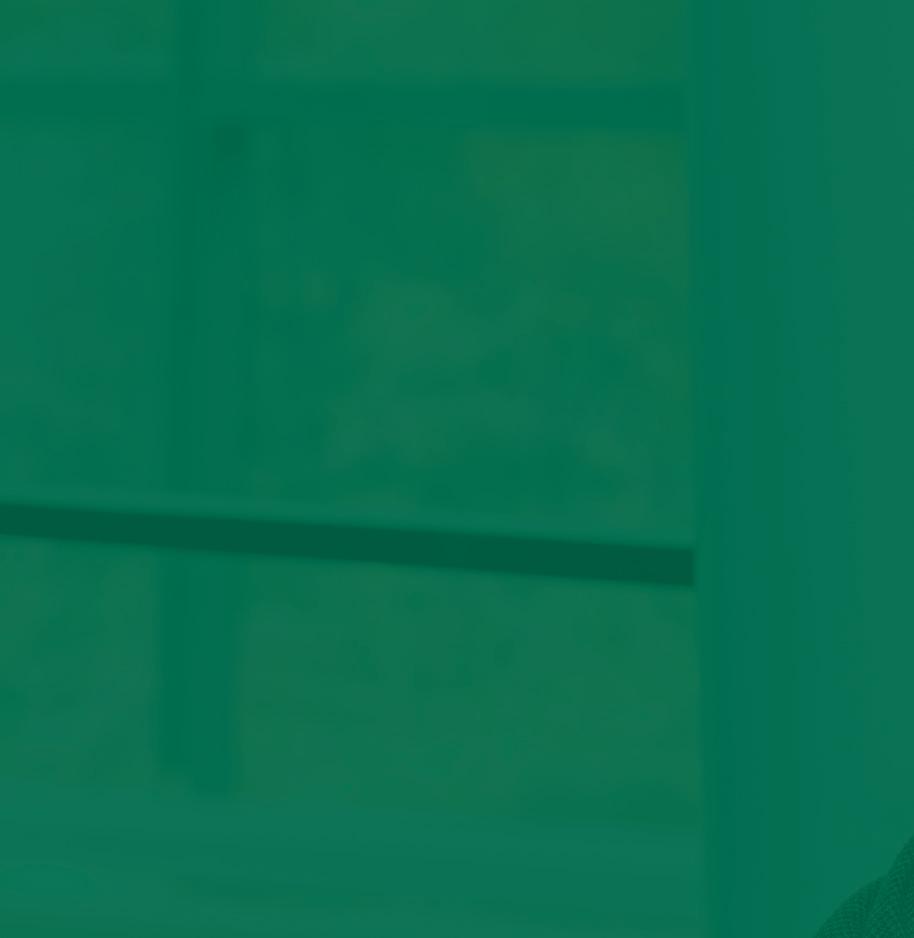Reaching Higher






SOM grad’s heart-stopping accident led to advocacy


Real world experience Alumni show students how to succeed
Helping rebuild Ukraine SOM researchers make global impact

Taking the field Goalie’s life lessons on road to MBA
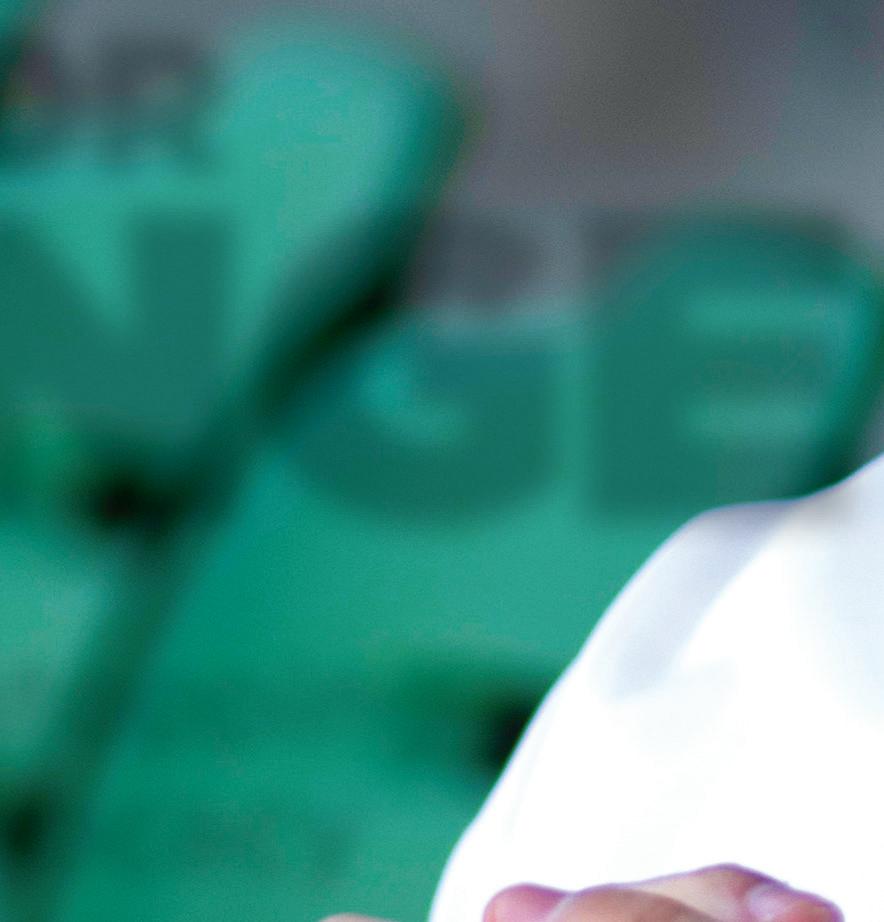



There’s no better time to call yourself a proud member of our SOM community!
Not only have we moved up in the national rankings as a top public business school, but our programs have been recognized for leading graduates to high-paying jobs in the fields of accounting, finance and marketing. This year also brought national recognition for our innovative Transformational Leaders Program, which earned an Inspiring Programs in Business award from INSIGHT Into Diversity magazine.
We’re committed to building SOM pride in some truly unique ways. Inside this year’s Reaching Higher, you’ll see these accomplishments are just a sample of how we’ve gotten the ball rolling.
Strong support from our alumni and friends helps us enrich the SOM experience. Whether it’s speaking in our classes, networking with students or simply engaging with us on social media, there are many ways to stay involved. You’ll read about two SOM graduates who have come back to share their professional skills with students and we’re sure you’ll find their stories inspiring.
We’re also embracing opportunities
for drawing upon SOM expertise in management, leadership and other areas to address social challenges in the Binghamton community and beyond. That includes our faculty research, which as you’ll discover in this magazine, is transformative and can even be used as a means of helping the people of war-torn Ukraine.
SOM students are equally driven to create change. Joe Mendrick, who graduated with his MBA in May, is just one example. Using a traumatic childhood experience as a catalyst, he helped the American Heart Association lobby New York State lawmakers for life-saving CPR training in schools.
No matter where they go or what they do, each member of our SOM community plays an important part in helping our already terrific school reach greater heights of success. Thank you for continuing to support us.
Warm regards,
Shelley Dionne, MBA ’94, PhD ’98 Dean, School of Management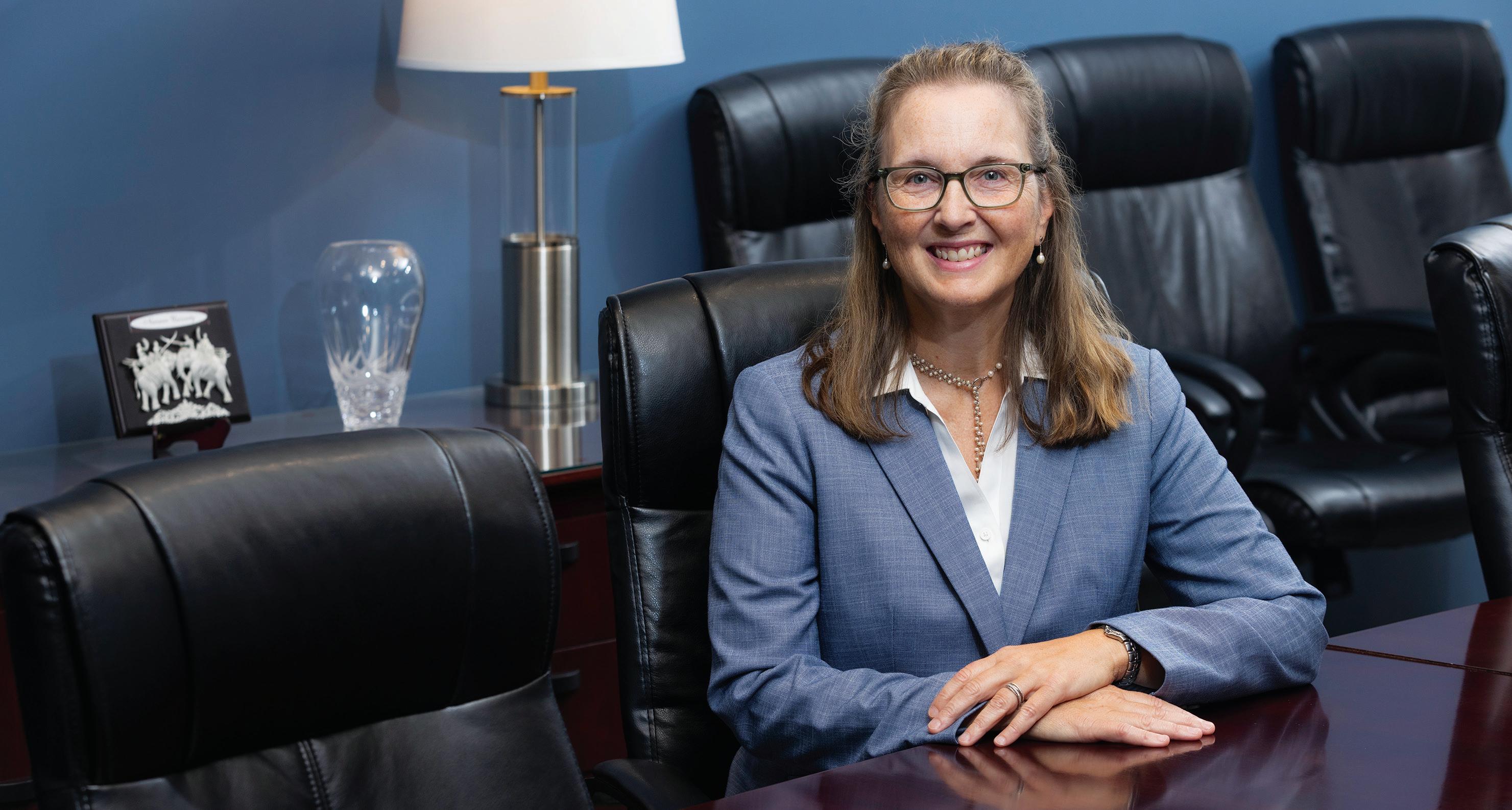
SCHOOL OF MANAGEMENT
DEAN
Shelley Dionne, MBA ’94, PhD ’98
ASSOCIATE DEAN
George Bobinski, PhD ’88
ASSOCIATE DEAN
Murali Jagannathan, PhD ’96
ASSISTANT DEAN
Linda Reynolds, PhD ’21
REACHING HIGHER MAGAZINE
EDITOR
Anthony Borrelli
ART DIRECTOR

David Skyrca ’85
PHOTOGRAPHER
Jonathan Cohen
CONTRIBUTING WRITERS
Chris Kocher
Kim Mousseau
My-Ly Nguyen Sperry ’00, MBA ’02
Allen Wengert
VICE PRESIDENT OF COMMUNICATIONS AND MARKETING
Greg Delviscio
SENIOR DIRECTOR OF CREATIVE SERVICES
Gerald Hovancik Jr.
COPY EDITORS
Natalie Blando-George
Eric Coker
Katie Ellis
On the cover: Joe Mendrick ’22, MBA ’23, used a childhood accident as an opportunity to make a difference by working with the American Heart Association to lobby for life-saving CPR training in schools statewide.
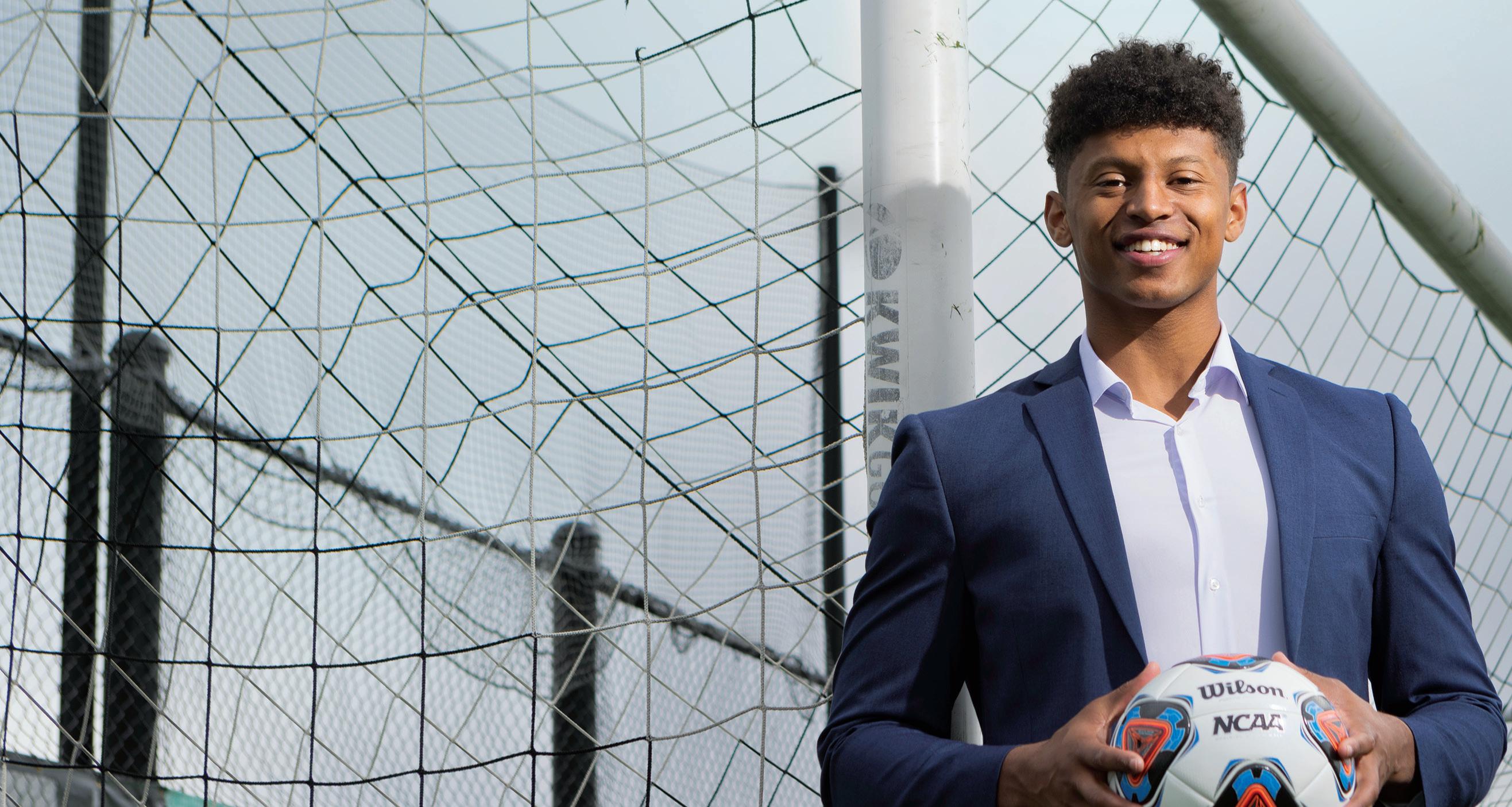
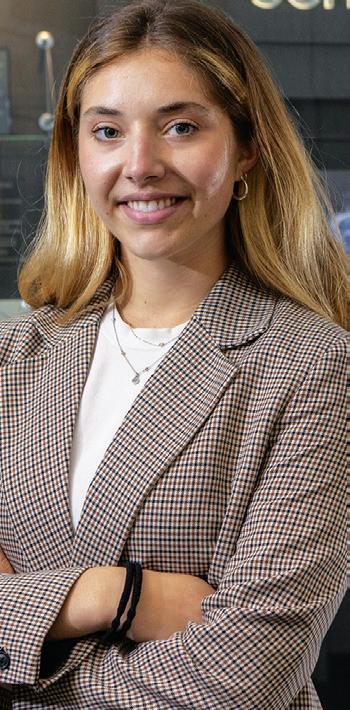
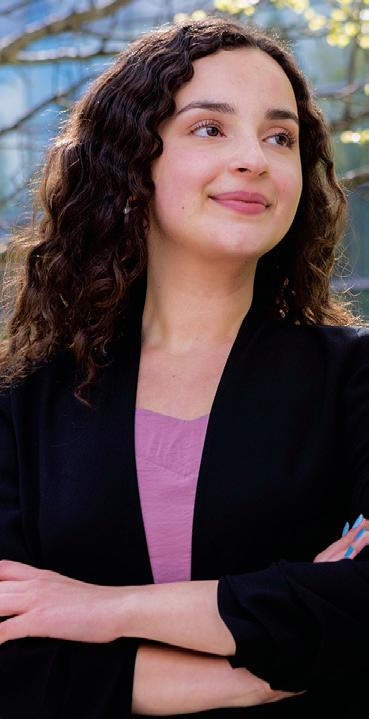




For the second consecutive year, the School of Management has been ranked as one of the nation’s top 10 public business schools.
SOM came in at number 26 overall out of the 93 schools ranked for the Poets & Quants Best Undergraduate Business Schools list, moving up a spot from the 2022 rankings. SOM also ranked within the top 20 schools for academic experience and in the top 30 for admission standards. This is the second year SOM has earned a top 10 ranking for fully public business schools.
Poets & Quants, an online publication for business education news, developed the rankings using data on admission standards, employment outcomes and surveys of the undergraduate class of 2020. Alumni provide feedback on their academic experience.
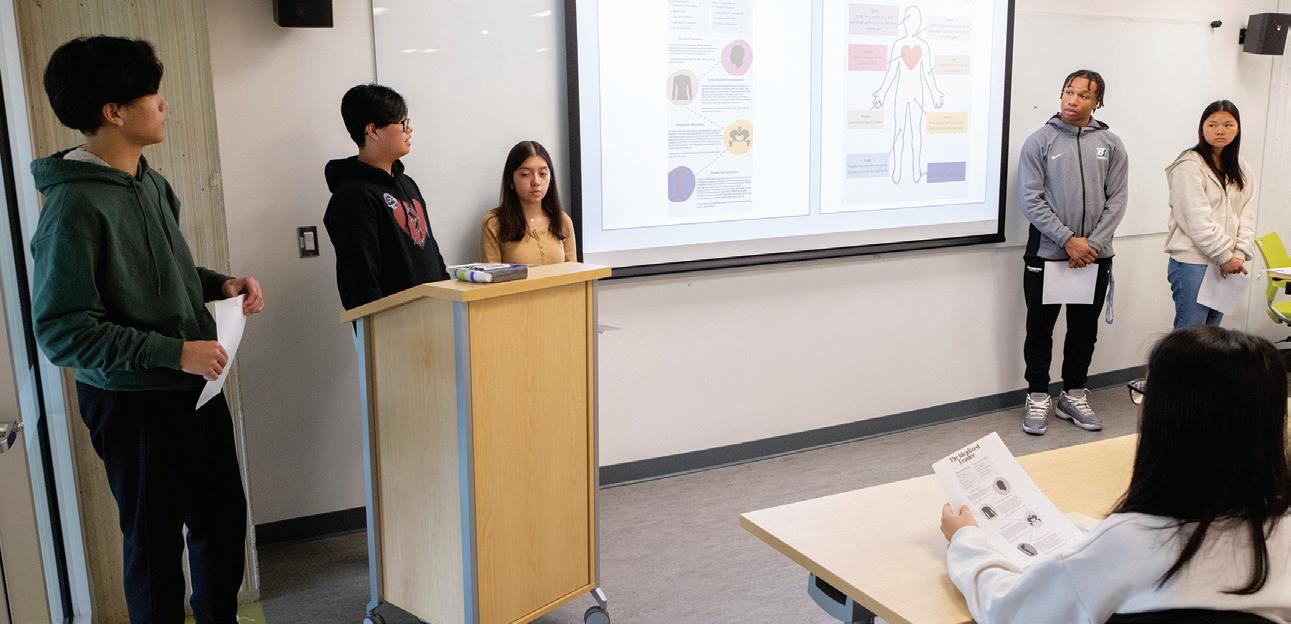
SOM also emerged as a top public school in the 2022-23
Wall Street Journal rankings for having graduates who land high-paying jobs in accounting, marketing and finance.
Binghamton University ranked third for graduates earning high-paying finance salaries and in the top 10 for high-paying salaries in accounting. For highpaying marketing salaries, Binghamton ranked in the top 20.

The School of Management’s Transformational Leaders Program earned national recognition with a 2023 Inspiring Programs in Business award from INSIGHT Into Diversity magazine.
INSIGHT Into Diversity, the country’s top diversity and inclusion publication in higher education, recognized the program for inspiring and encouraging young people to consider careers in business through mentoring, teaching and research.
Launched in 2021 and established with the support of alumni donors, the three-year Transformational Leaders Program provides individualized guidance for SOM students from underserved populations and/ or those who may be facing economic challenges.
In addition to the development of specific skill sets each year, the program fosters professional growth by allowing students to participate in industry visits and meetings with top executives from major companies.
PwC Scholars in the School of Management spent the spring 2023 semester renovating the offices of Truth Pharm, a Binghamton nonprofit organization that focuses on substance use harm reduction for their annual community service project.

PwC Scholars raised about $15,000 for the project, which took two months to complete. More than 100 students took part in the project.
The work included:
• Redesigning Truth Pharm’s office space
• Installing new flooring for office space and meeting rooms
• Painting walls and murals in the building
• Street cleanup and hanging a new outdoor banner
• Assembling Narcan® kits
As part of their community service, PwC Scholars also trained and certified 100 Binghamton University students in the use of Narcan®, which can reverse the effects of an opioid overdose.
School of Management students in Binghamton University’s Dual-Diploma Program (DDP) and the Turkish Culture Association (TURCA) gathered donations and raised funds to help victims of the devastating February earthquake in Turkey.
Students raised about $3,000 from selling Turkish and other baked goods, and sent the money through Google, which offered to double the donations. That resulted in nearly $6,000 being sent on behalf of Binghamton students.
Students also packed one 16-foot truck and one 10-foot truck with clothing, insulated tents, sleeping bags, diapers and many more essentials to send to the Turkish Consulate in New York City. Other efforts included tabling in The Union to share information about where to donate and hosting an on-campus remembrance event for victims.
Three School of Management alumni received Bearcats of the Last Decade (BOLD) 10 Under 10 Alumni Awards in a May ceremony at the Penn Club of New York in Manhattan.
BOLD awards recognize outstanding alumni who earned Binghamton University degrees within the last 10 years. The following SOM alumni were honored:
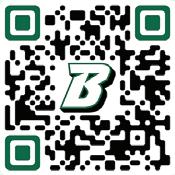
Bill Landis IV ’13
Outdoor Leadership and Recreation Department chair, Pikes Peak State College
Brad Matican ’19
Senior Preferred Office Banker, JPMorgan Chase
Zack Smith, MBA ’15 Senior manager specializing in real estate valuation, Withum
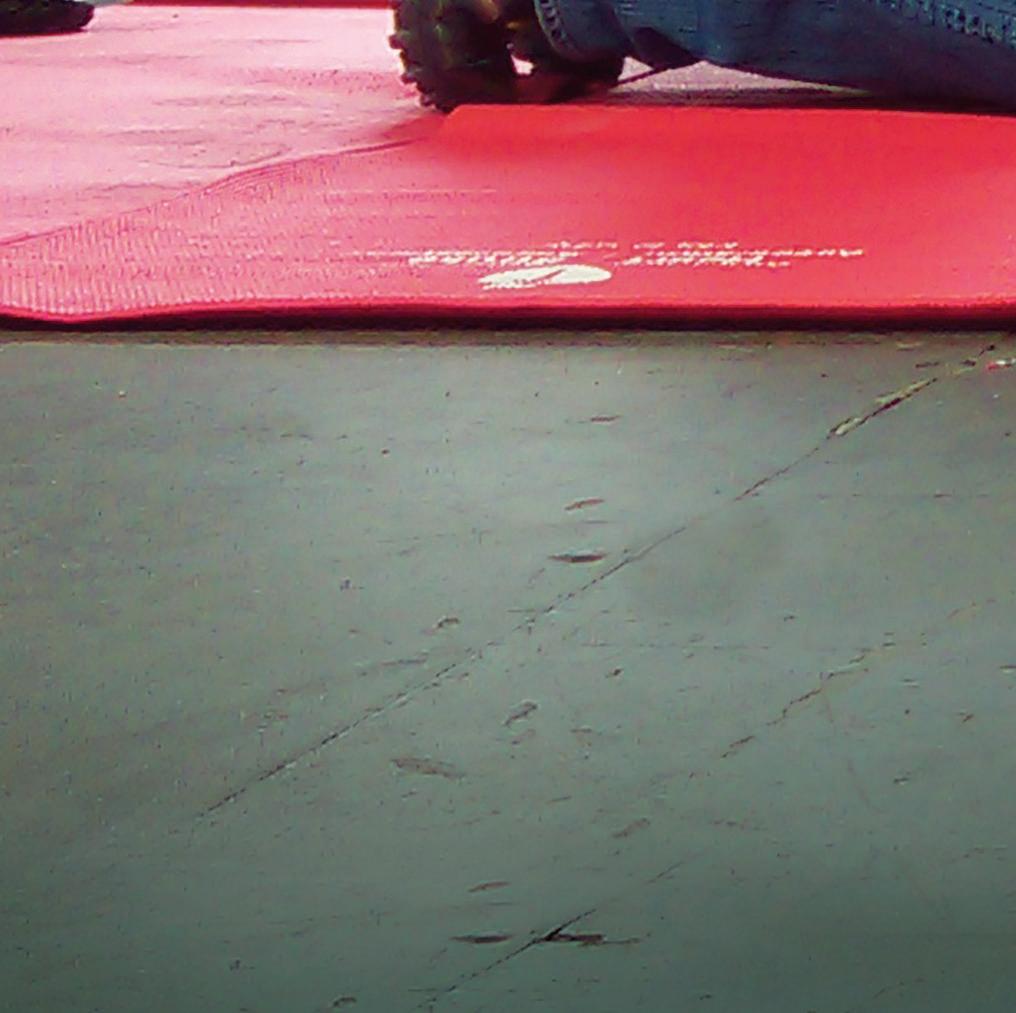
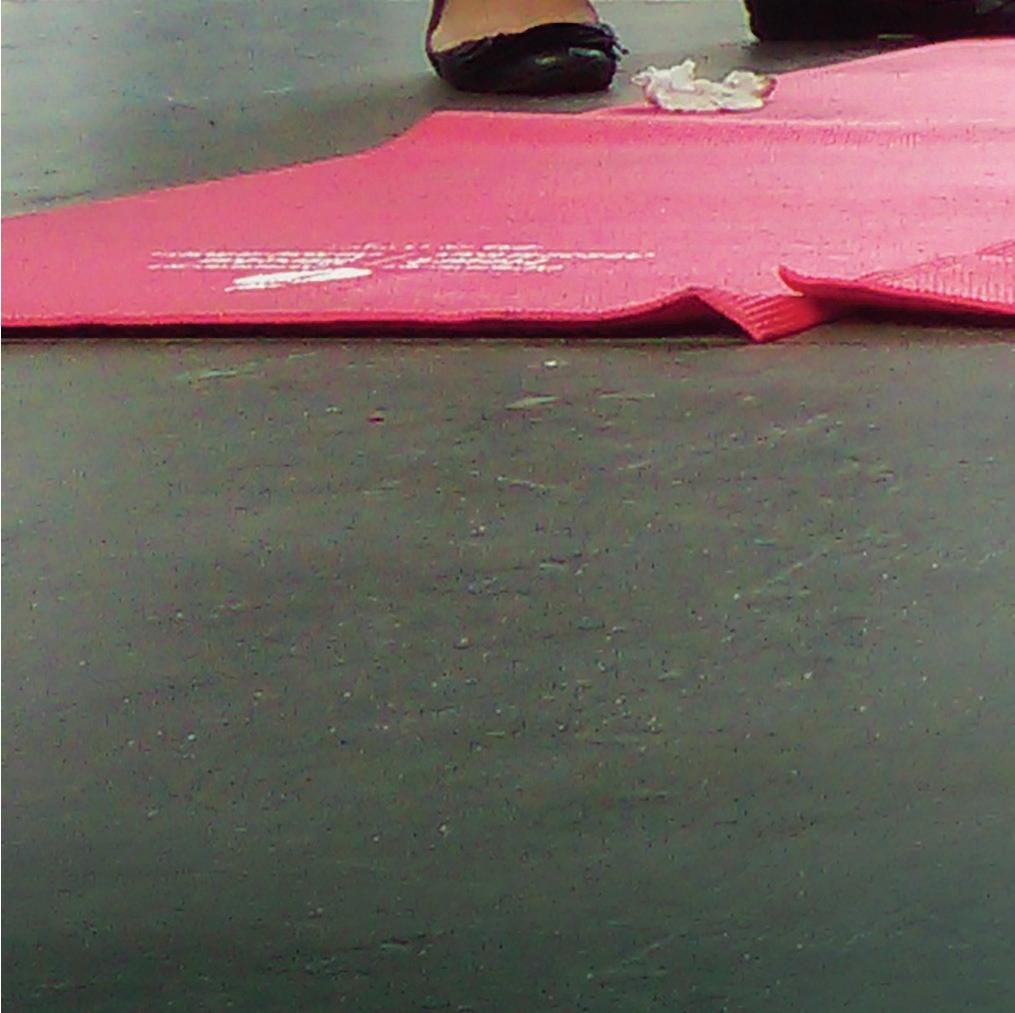
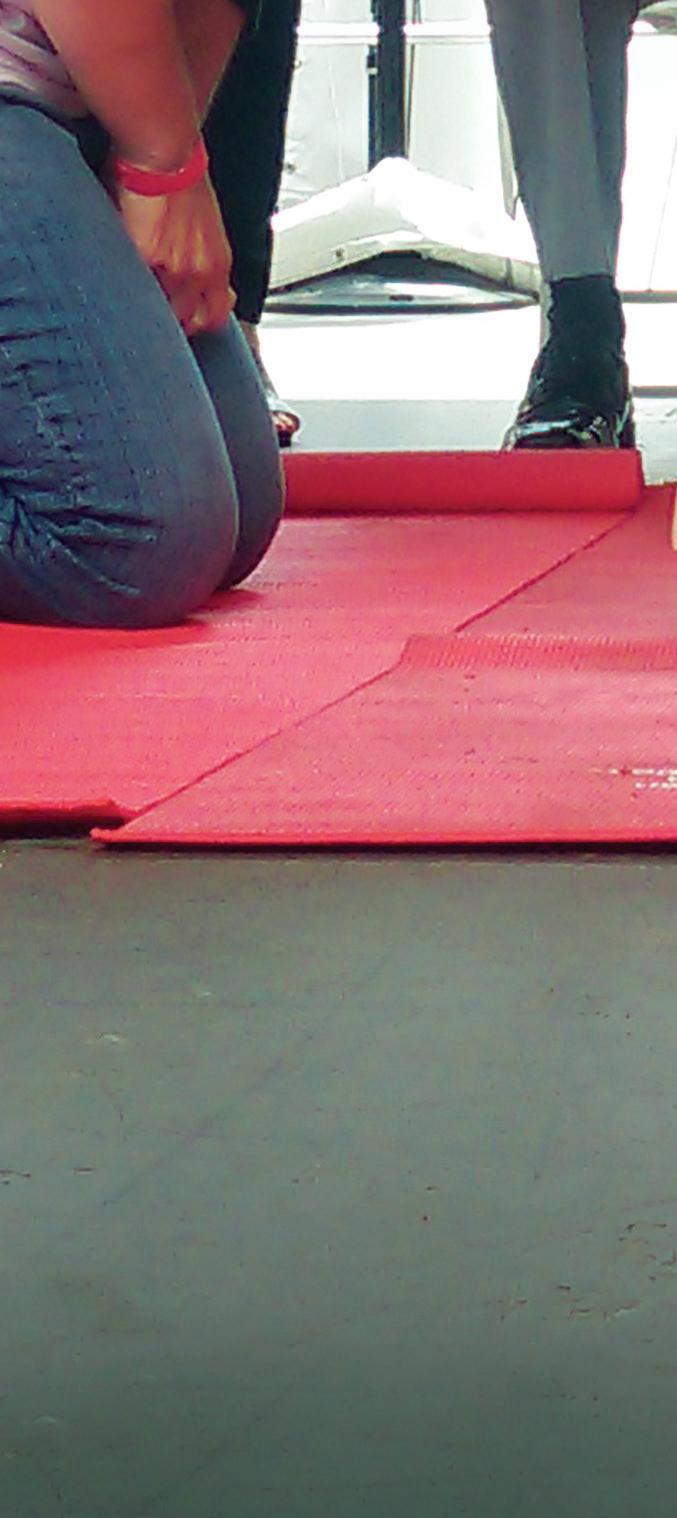
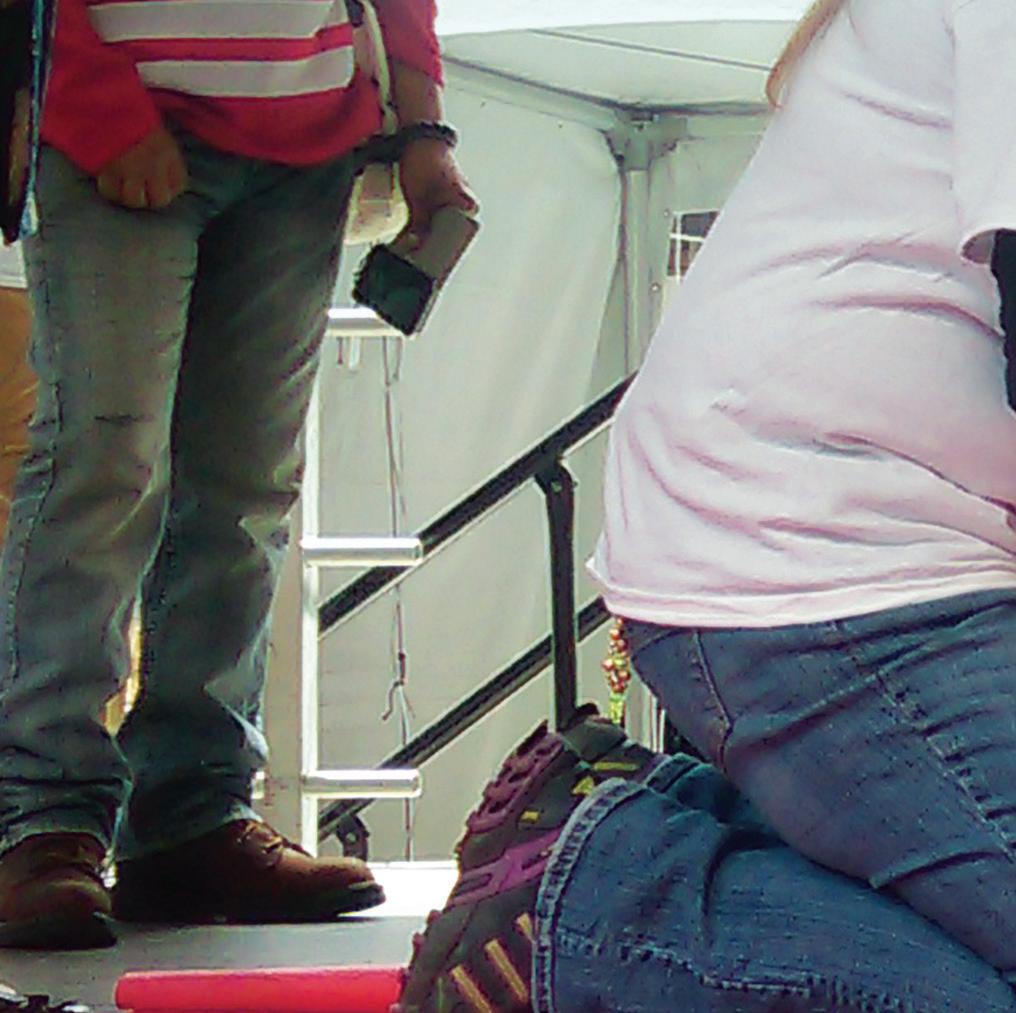
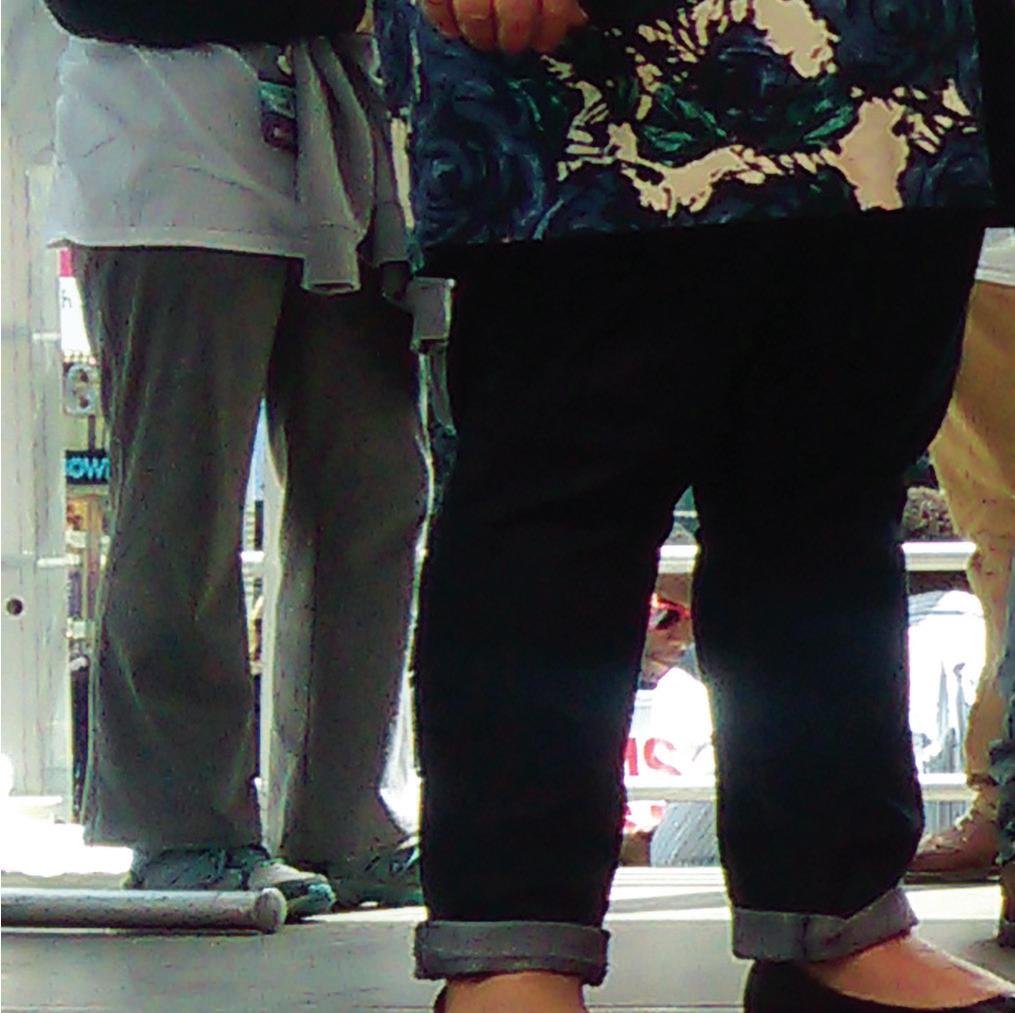

 By Allen Wengert
By Allen Wengert
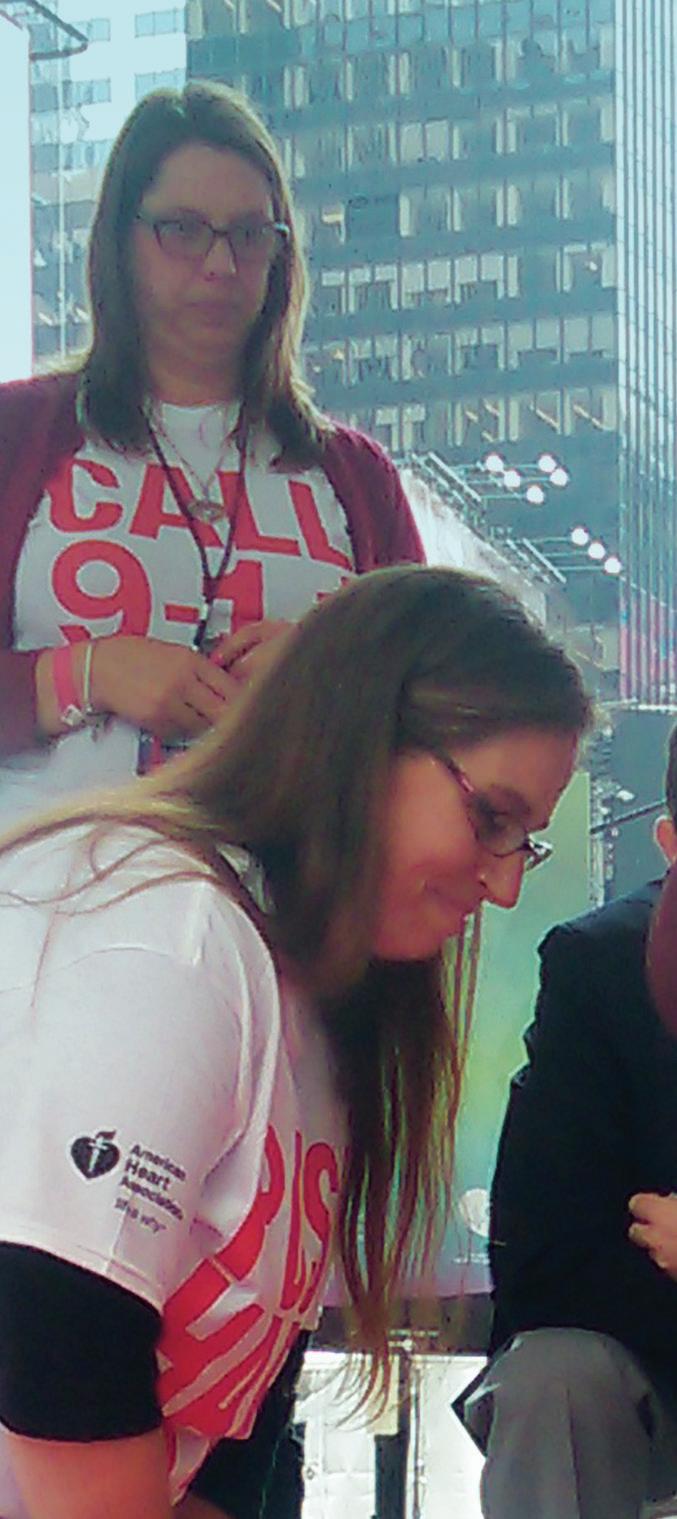
record


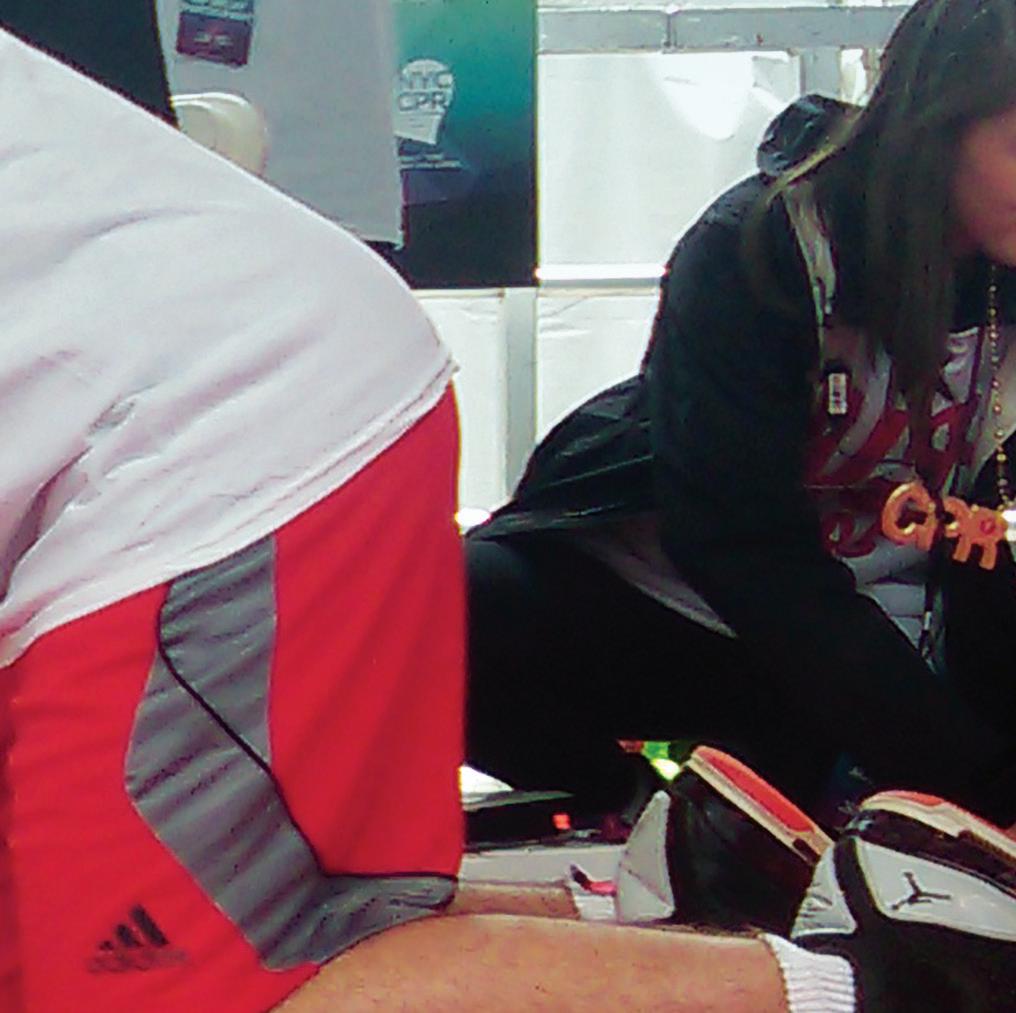

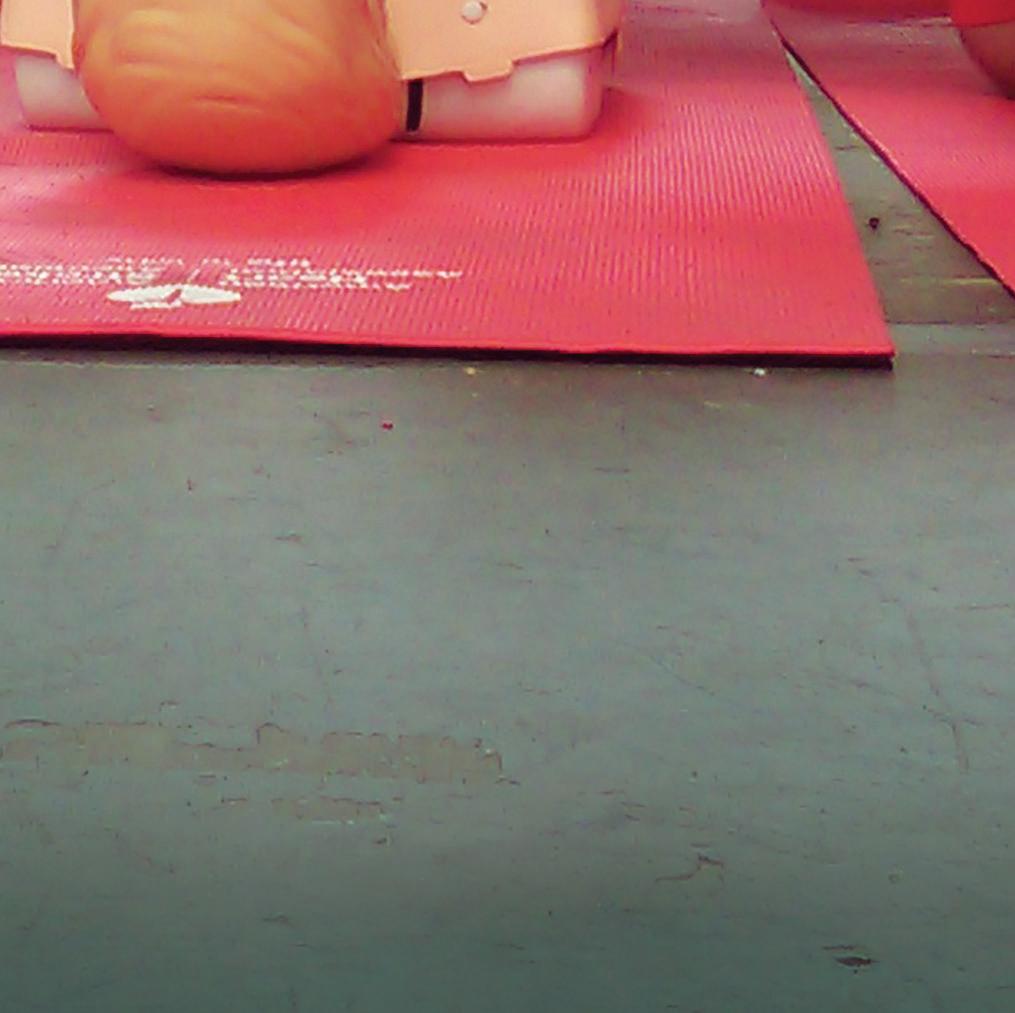
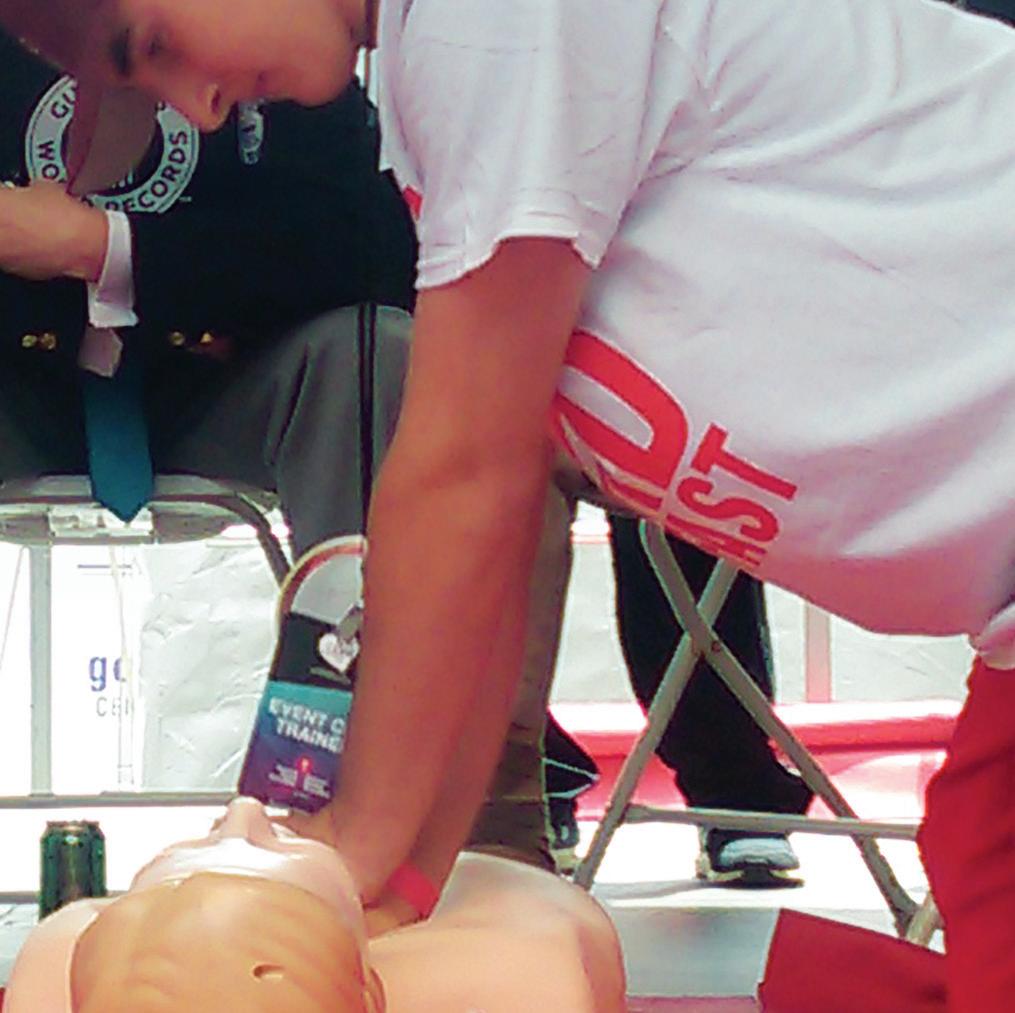


hen he was only 11 years old, Joe Mendrick’s heart stopped beating.


“I don’t remember that day whatsoever,” says Mendrick. “All I know about that day is from what people have told me.”
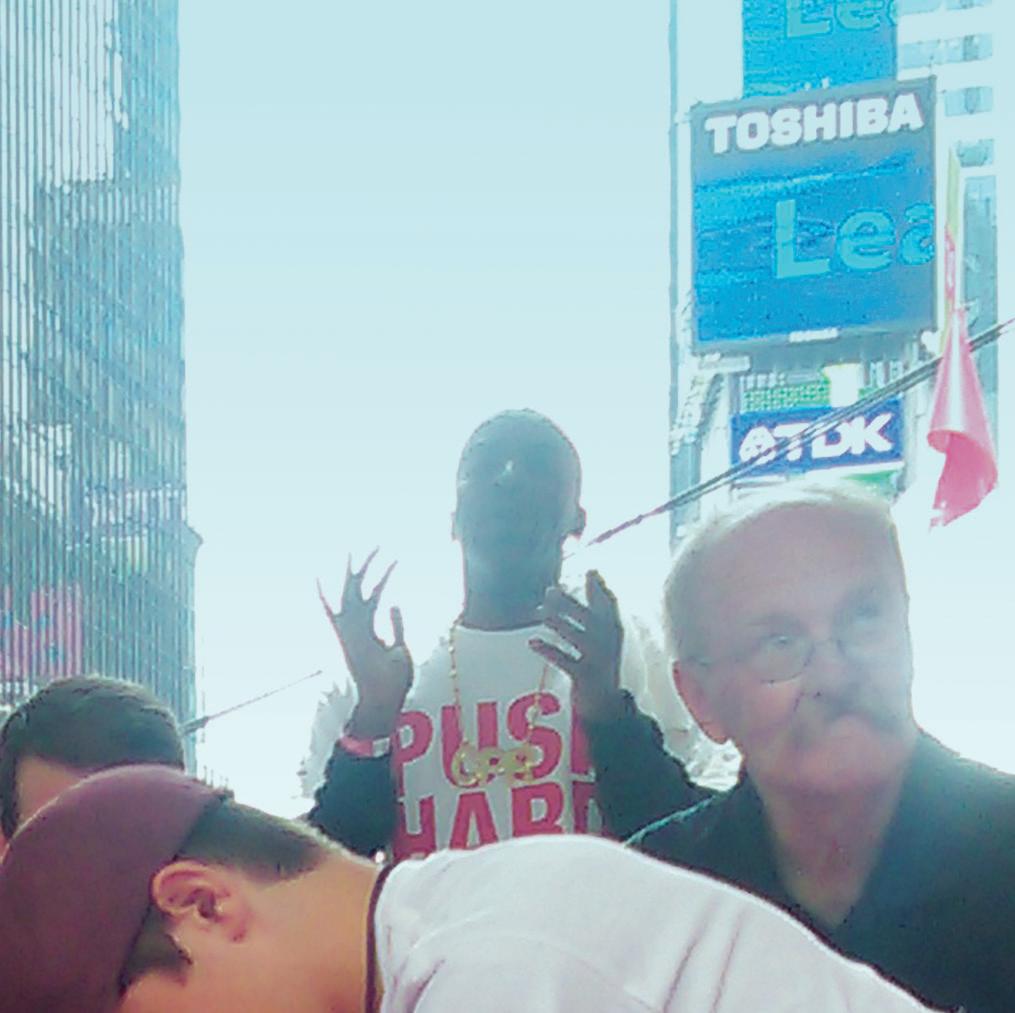 Joe Mendrick and his mother Lauren joined the American Heart Association in June 2015 to help set a
number of people trained in Hands-Only CPR during a relay event in New York City’s Times Square.
Joe Mendrick and his mother Lauren joined the American Heart Association in June 2015 to help set a
number of people trained in Hands-Only CPR during a relay event in New York City’s Times Square.
On April 16, 2012, Mendrick went up to the plate to bat in his little league game in Colonie, N.Y. The pitcher threw the ball, and he swung. The baseball struck him in the chest.

What happened next can only be described as a statistical anomaly. Hitting him at just the right speed and at just the right moment during a very short window in his heart rhythm, the strike disrupted his heartbeat and sent him into a very sudden cardiac arrest, stopping his heart completely.
This condition, known as commotio cordis, is extremely rare, with less than a dozen new cases reported each year, according to the American
Because of the lack of oxygen being transported to his brain during the accident, there was an initial fear that he had suffered brain damage. However, tests showed that this was not the case.
“Somehow, there were no issues or complications whatsoever,” he says. “I’m very lucky.”
His family was by his side during his recovery. Mendrick says it was his father who inspired his love of baseball.
“He always tried to get me to watch baseball games when I was younger, but I could never get into it,” he says. “But then he took me to a Yankees game and being in that environment – it was kind of a life-changing experience for me.”
Mendrick decided not to let the accident stop him from playing baseball.
“I didn’t want this to scare me away from baseball, because it was such a freak accident. There is such a slim chance of this happening to me again, and I didn’t think it was worth me not playing baseball anymore,” he says.
Mendrick would go on to continue playing baseball until he graduated high school.
Heart Association. It became more widely known after Buffalo Bills football player Damar Hamlin suffered from the condition during a nationally televised game in January 2023.
Mendrick collapsed. His coach began doing CPR compressions immediately. 911 was called. Others, including a police officer, began to help with CPR until an ambulance arrived.
Thankfully, the paramedics and EMTs were able to get Mendrick’s heart beating again.
“I was dead without a heartbeat for about six minutes or so,” says Mendrick.
“I’m so very thankful for everyone who was there that day. They helped me survive.”
Mendrick doesn’t remember much of the week he spent in the hospital, but the brain scan in an MRI machine stands out.
“It’s kind of funny – I was a Chris Brown fan at the time, so they had that playing on the speaker during the MRI. I remember them playing that music,” he laughs.
To say Mendrick took an unfortunate event and turned it into a positive is an understatement. He went on to become an advocate with the American Heart Association (AHA), a nonprofit organization that funds research and educates the public about cardiovascular health.
“My gym teacher’s wife worked with the AHA and thought my story could make a real impact,” Mendrick says. “So, he asked me in gym class if I was interested in helping them and we took it from there.”
Mendrick started helping with AHA events that educated others on the importance of CPR. He even helped set a Guinness World Record for the most people performing consecutive CPR at an event in Times Square. Celebrities such as television personality Star Jones and WNBA player Tina Charles were even in attendance.
“It was a marathon of people just getting in line to do CPR on a mannequin, and it went on for almost eight hours,” he says. “The record was broken again shortly after, but it was a fun opportunity for us to train a bunch of people how to do CPR.”
Mendrick began lobbying for New York state to require high schools to offer training in handsonly CPR to students. Whether it was speaking to
“BINGHAMTON IS AN AMAZING SCHOOL. EVERYONE HAS GOALS, EVERYONE HAS AMBITION.”
legislators in Albany, N.Y., or sharing his story with news reporters, Mendrick was determined to help get the requirement passed.
“I was in the chamber when the bill eventually passed. It only took a couple of minutes – it was much quicker than I expected,” he recalls. “It was a great day, and I’m so proud of the efforts that went into getting it done.”
Mendrick hopes his advocacy, and the lives that could be saved because of it, will be a lasting part of his legacy.
“I think a lot of people remember me for the accident, but there is so much more to it,” he says. “I’d rather be remembered for what I did as a result of the accident.”
With an interest in financial markets, Mendrick came to the Binghamton University School of Management to major in business administration with a concentration in quantitative finance. He went on to earn his Master of Business Administration (MBA) at SOM, which he completed in May 2023.
“Binghamton is an amazing school,” he says.
“There are so many different people here, and they are all hard working. Everyone has goals, everyone has ambition, which is something I really appreciated because I have big ambitions myself.”
Now a financial planning consultant in the Albany area, Mendrick hopes to one day break into investment banking in New York City.
While his baseball days are mostly behind him, Mendrick has taken up some new hobbies like golfing, snowboarding and fishing. He’s also upped his chess game.
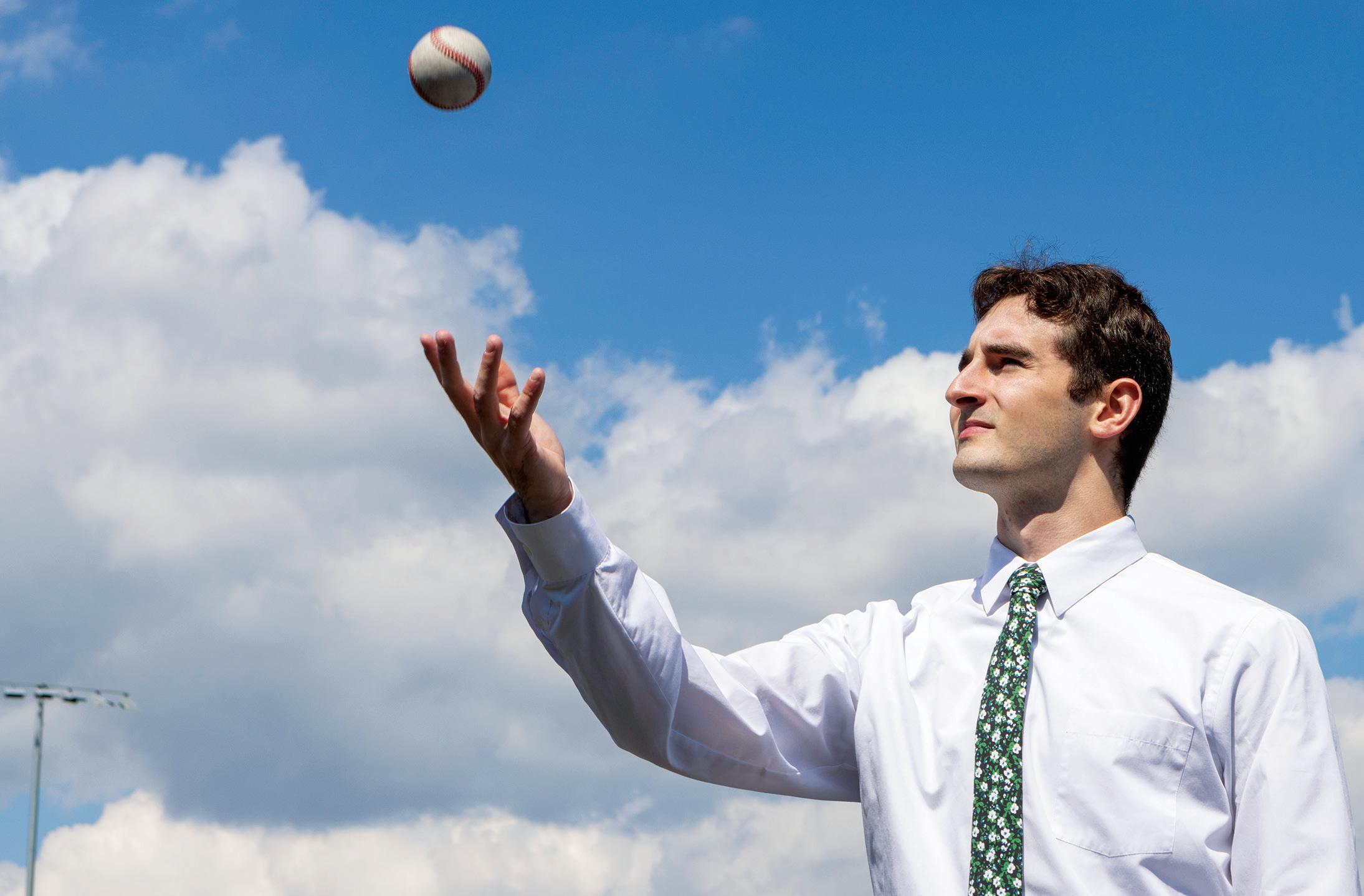
“I’ve been playing chess since I was young, but played a lot more in college,” he says. “I’ve been working on it and have gotten pretty good.”
More than 11 years have passed since the accident and in that time, Mendrick has learned to contextualize the weight of what happened to him.
“I was a different person back then. I was a kid, and it was hard to wrap my head around what happened,” he says.
“Now, I can recognize just how serious the incident was and see the impact I made with the American Heart Association in getting the handsonly CPR legislation passed. And when I look back on it now, I’m very proud.”
“I WAS DEAD WITHOUT A HEARTBEAT FOR ABOUT SIX MINUTES … I’M SO VERY THANKFUL FOR EVERYONE WHO WAS THERE THAT DAY.”
“Rebuilding Ukraine means rebuilding a society — people.. returning to their coffee shop or their restaurant, the private.. sector companies that have thousands of employees — the kinds.. of things we management scholars are good at exploring.”..



 By Anthony Borrelli
By Anthony Borrelli
For Andre Havrylyshyn, the news updates on the Russian invasion of Ukraine are daily reminders.
They remind him that, amid the turmoil, his nephew, his cousins and his godfather who still live in Ukraine are all finding ways to keep going about their daily lives.
Those family members are working also, too, to help displaced people find housing in a war-torn country.

They’ve carried on, and with each reminder of that resilience, Havrylyshyn, a Ukrainian-American and assistant professor in the School of Management, has grown eager to help in a meaningful way.
He hadn’t considered how his own expertise in strategic management might be of use.
That is, until a colleague posed an intriguing hypothetical scenario: What if the phone rang and it was Ukraine’s president Volodymyr Zelenskyy, seeking his advice as an expert in strategic management? What if he asked Havrylyshyn, “What should we do as we rebuild our country?”
What if research that began at SOM could help inspire other scholars to draw upon their own areas of expertise to help Ukraine in similar ways?
For Havrylyshyn and Rory Eckardt, an associate professor in SOM, a series of research projects that began earlier this year are designed to draw out answers to those complex questions.
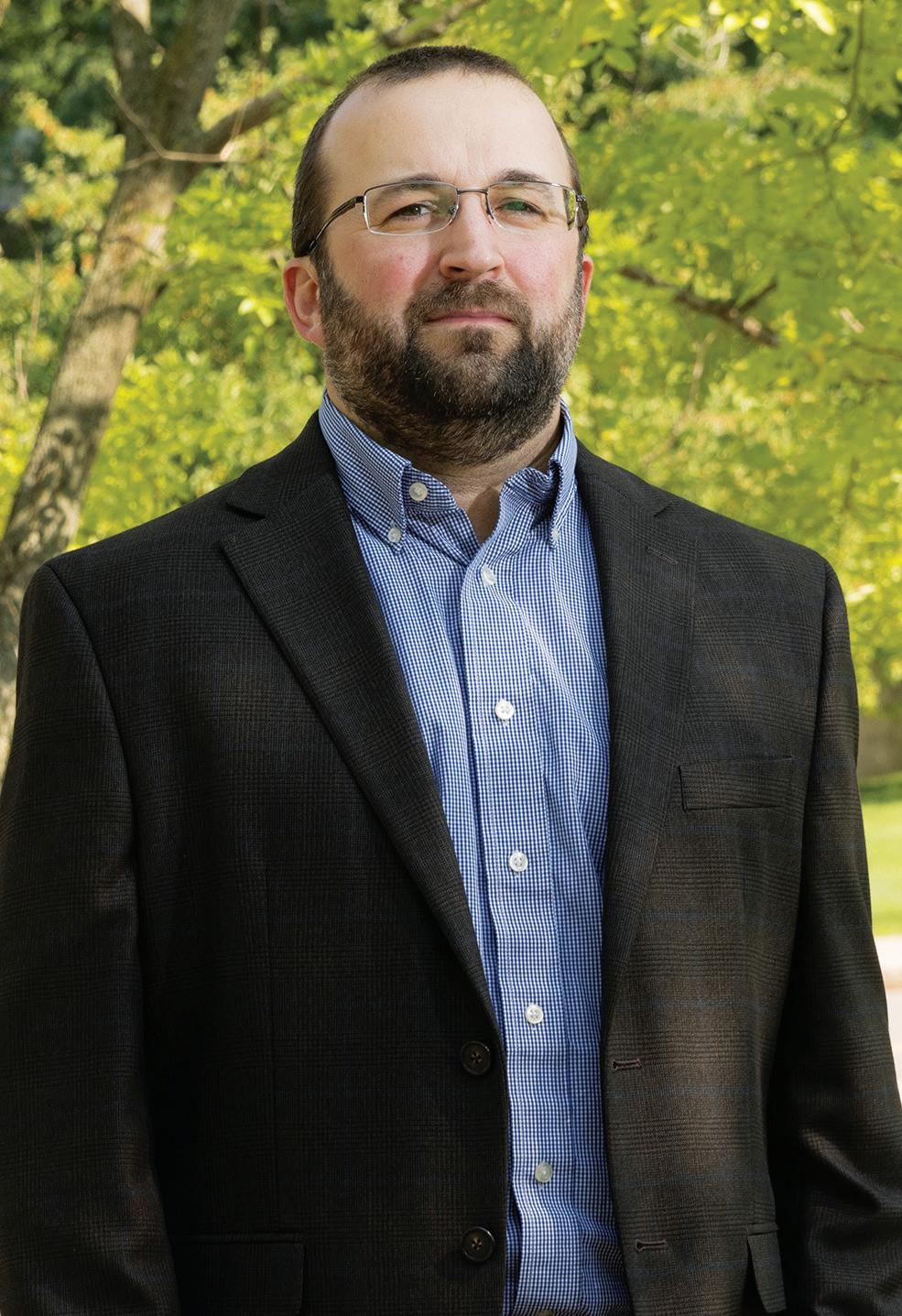
“We’re experts in the running of organizations and we’re hoping to leverage our management expertise in a way that could help the people of Ukraine,” Havrylyshyn says. “Rebuilding Ukraine means rebuilding a society — people returning to their coffee shop or their restaurant, the private sector companies that have thousands of employees — the kinds of things we management scholars are good at exploring.”
The research has been divided into several areas — studying what rebuilding Ukraine
could involve from management perspectives, speaking with people affected by geopolitical events and exploring how companies around the world respond to governmental action. It demonstrates just one of the ways SOM researchers are making a global impact.
“To implement this research, it involves collaborations in Ukraine with institutions, other universities, government organizations and nonprofits,” Eckardt says. “We want to get more people involved, because I think the future is going to be full of even more complex issues to work around.”
Not long after the Russian invasion in February 2022, Havrylyshyn reached out to contacts at organizations based in Ukraine to offer any assistance from an academic standpoint. He gave a few virtual lectures to private sector organizations based there, mostly about administrative obstacles connected to living in the midst of a war.
Later, a Ukrainian university invited Havrylyshyn and Eckardt to guest speak virtually at a conference focused on the role of nonprofit organizations in Ukraine’s recovery.
The conference centered on how management scholars could address challenges for non-governmental organizations (NGOs) in Ukraine and what insights drawn from the private sector could make those NGOs more effective.
“That sort of thinking, even if done in the abstract, is relevant because it helps the people of Ukraine in their rebuilding process to be as effective as they can be with the resources they will have available to them,” Eckardt says.
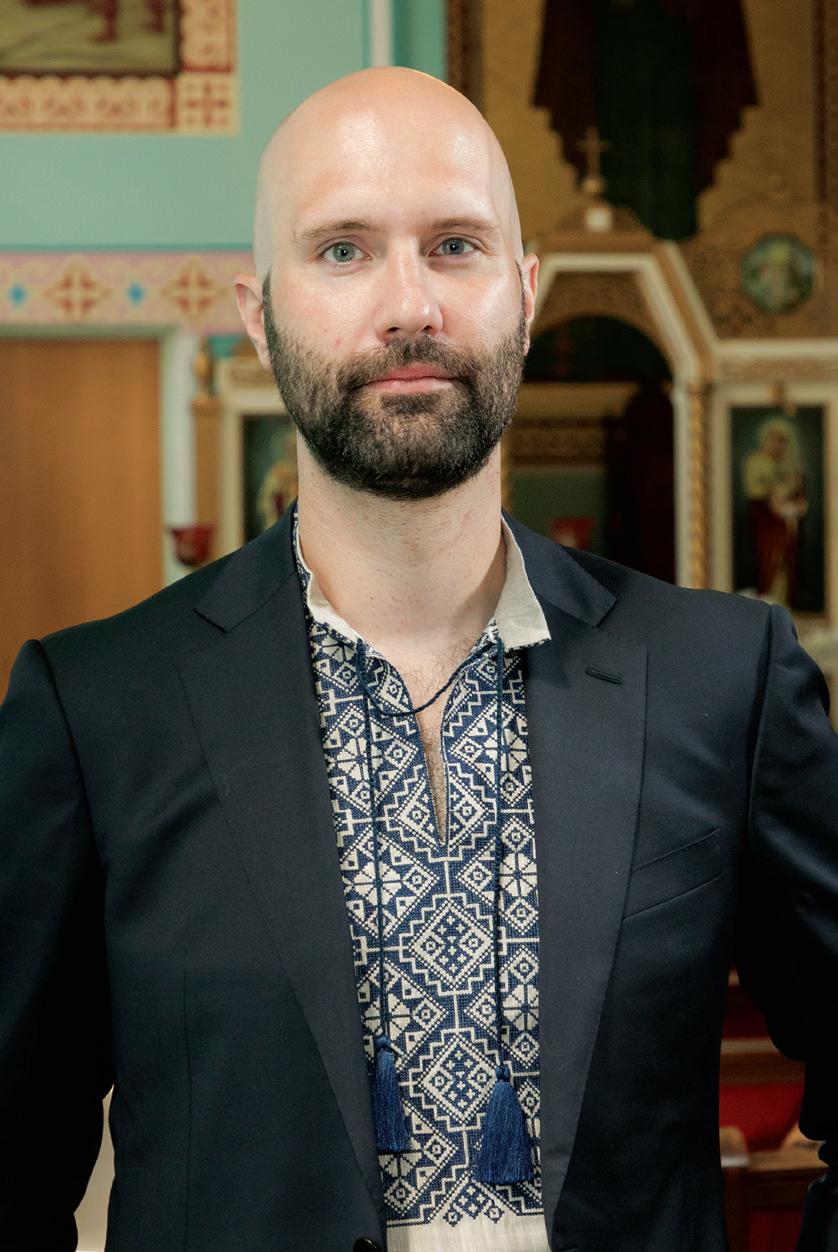
More motivated than ever and with greater knowledge of what Ukrainians were facing, these experiences paved the way for Havrylyshyn and Eckardt to explore new research to help Ukrainians deal with such long-term challenges.
A starting point for the pair of researchers involved teaming up with fellow academics to study what value using their research skills to help
Ukraine could bring, beyond immediate assistance to those affected by the war.
They wanted research to not only be impactful, but broad enough to avoid becoming quickly outdated and potentially help add context in the discussion of similar events in the future.
“It can mean just looking at a case study of what’s going on over there that builds more broadly on what makes for good management,” Havrylyshyn says, “but it can also mean doing new research outside of Ukraine by looking at problems and considerations that are key to what people there are living through.”
Havrylyshyn is also interviewing people who are closely tied to Ukraine for various reasons but live in other countries.
He wants to understand how they’re affected by such significant geopolitical events while still going about their daily routines.
“We’re interested in learning not only how people in those situations balance that,” Havrylyshyn says, “but also what their colleagues could and should do in terms of supporting them.”
Another research project in the works explores how the situation in Ukraine plays into a larger context. In this case, Havrylyshyn is working with other colleagues to understand why some companies take a stand and essentially boycott a government’s action, particularly one that’s divisive or largely viewed as negative.



They started by investigating how and why some companies such as McDonald’s exited the Russian market after the invasion of Ukraine, while others did not. While there are many other high-profile examples of firms boycotting governments to make a moral statement, that has been largely unexplored by management researchers. Havrylyshyn says this study is trying to address that research gap in a meaningful way.
One of the aspects Havrylyshyn and Eckardt find most unique about their research is how it centers on a complex situation that isn’t easy to understand for many people. There are few places in the world where people are living through a scenario like what has been playing out in Ukraine in the past year.
But ultimately, their research is driven by the desire to understand what lies ahead for a country in turmoil. Of their many related research projects, perhaps their most critical is a study Havrylyshyn and Eckardt have undertaken that deals with the issue of rebuilding Ukraine.
To help ensure this research could be truly impactful, they determined it also had to draw upon the wealth of existing academic literature available from political science and international relations experts.
“Just doing a paper about what you need to know if you’re a manager of a private-sector company in Ukraine wouldn’t be enough,” Havrylyshyn says. “It’s got to be about how NGOs work with privatesector institutions and with the government, and should also address what role religious institutions, like the Ukrainian Orthodox Church, are going to have in that process.”
Havrylyshyn and Eckardt aren’t expecting a call from Ukraine’s president anytime soon asking for their input. Their goal, instead, is to lay out a broader research agenda with policy and practical implications to help the people in Ukraine.
Eckardt says it’s for the people of Ukraine to decide what their rebuilding process looks like in the future, but he hopes this research can demonstrate SOM’s ability to make a social impact.
“We’re demonstrating how we can do research that contributes not only to scholarly literature and scientific domains but can also be impactful and important to society.”
“We’re demonstrating how we can do research that not only.. makes a contribution to scholarly literature and scientific.. domains but can also be impactful and important to society.”..
— Rory Eckardt, associate professor..
hether it’s coming back to teach a course, mentoring a student group or playing a recurring role in judging case competitions, School of Management alumni can draw upon their professional experiences to help current students meet the demands of an evolving business landscape.
Two graduates, Sydney Sherman ’17, MBA ’18, and Richard Berr ’91, MS ’93, have found opportunities to stay involved by returning to the classroom. While they embraced different professional paths, both agree not every lesson for a successful career can be found in a textbook.
Here’s the challenge: Write a single page about yourself, outlining your goals and values. Next, whittle that page to just one paragraph.
You’re not done yet, Sydney Sherman tells her SOM students. Now, take that paragraph and boil it down to a single sentence.
What’s left, Sherman says in her strategic brand management course, should guide how you
make important decisions about promoting your personal and professional brand.
As a customer relationship manager at the New York City–based luxury real estate brokerage SERHANT, Sherman knows brand management relies on the ability to craft a strategic decision and communicate your goals in a way that invites others to buy into the concept. For the past three semesters at Binghamton University, Sherman has channeled the expertise she’s honed throughout
her career through a virtual class designed to pass those lessons on to the next generation of marketers and business professionals.
“I tell my students we need to think about how the market’s perception equates to how we want our brand to be perceived, because as marketers, we need to know this process to make strategic decisions about our company’s brand,” Sherman says. “In today’s world, we’re also our own personal brands, so I tell students that’s something they’ll have to really take this time early on to establish and create, because their careers are going to be built off that.”
During her time as an SOM student, Sherman built the foundation for her career by taking advantage of networking opportunities. On campus during her undergraduate and graduate years, she held various positions with SOM Graduate Advising before landing a full-time job as its marketing and recruitment coordinator.
“It really built my passion for marketing and education,” says Sherman, who enjoyed that experience so much that she returned to Binghamton after earning her MBA in 2018 to
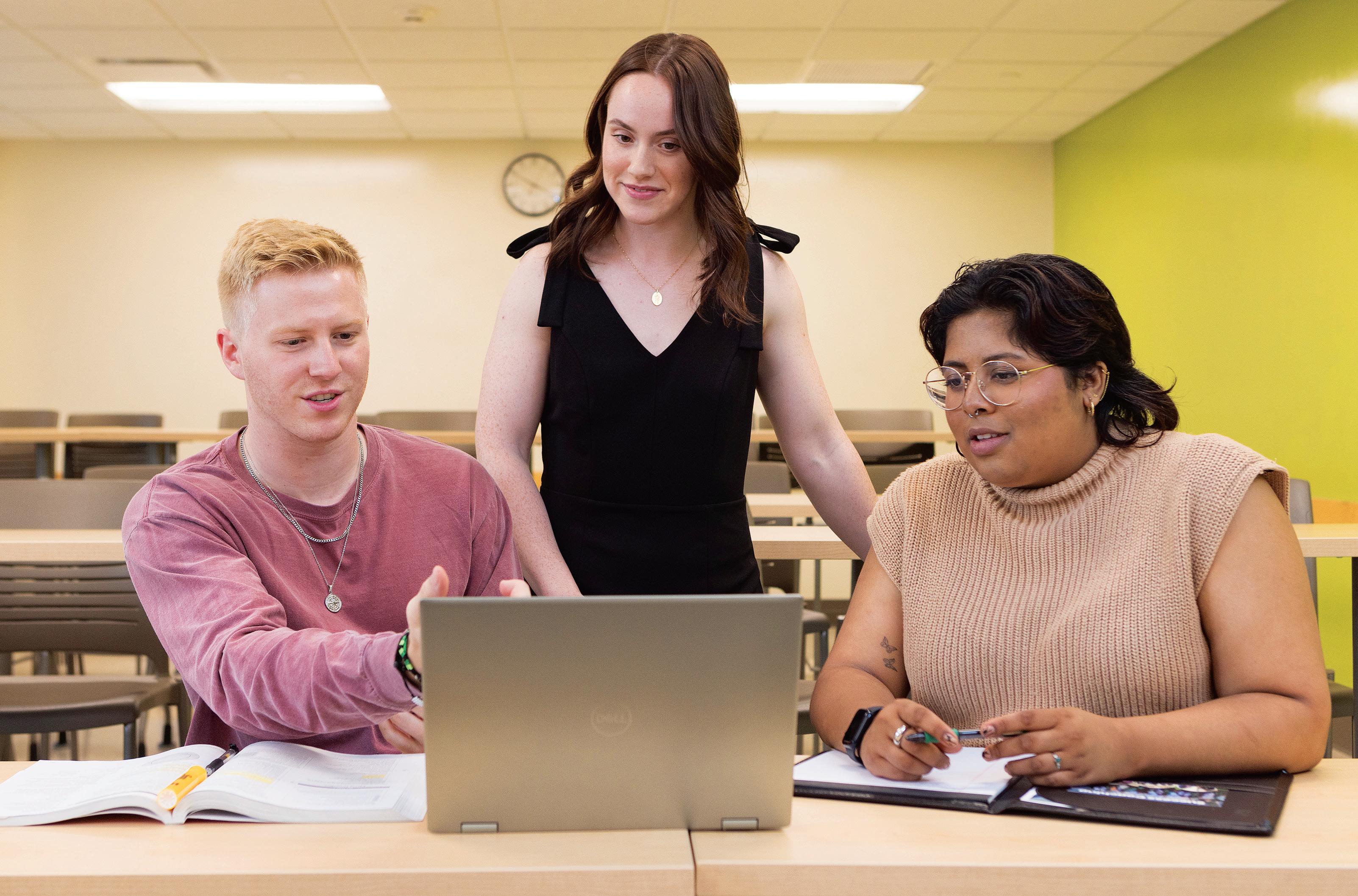
lead periodic leadership lectures at the School of Pharmacy and Pharmaceutical Sciences. During those lectures, Sherman discussed how the leadership concepts taught in SOM could be applied to the progression of students’ pharmaceutical careers.
The chance to share her expertise through those lectures proved to be so enjoyable, she says, that a later invitation to help cover a class in strategic brand management in SOM was too good to pass up.
“Throughout that first semester I was teaching, I got so much great feedback from the students. I loved having the ability to come in still relatively early on in my career and share my experience, while also introducing new perspectives,” Sherman says.
Much of Sherman’s day-to-day duties at SERHANT involve figuring out how to generate leads for agents and managing those relationships effectively enough to foster repeat business with clients in a way that feels personal as the company continues to grow.

Her expertise in building strong professional
Sydney Sherman is one of many SOM graduates who found ways to stay involved and share professional experience with current students by returning to teach a class.
connections also works to her students’ advantage when she invites marketing experts to speak in the virtual classes. Sherman lays the groundwork with her students by teaching the broad concepts, then her guest speakers reinforce those concepts by explaining how they might be applied in different professional settings.
“Not everything in brand management has solutions you can look up in a textbook,” she says.
One of the biggest lessons Sherman learned in the early stages of her career was that strategic decisions in brand promotion are often made without having all the information you want at your fingertips.
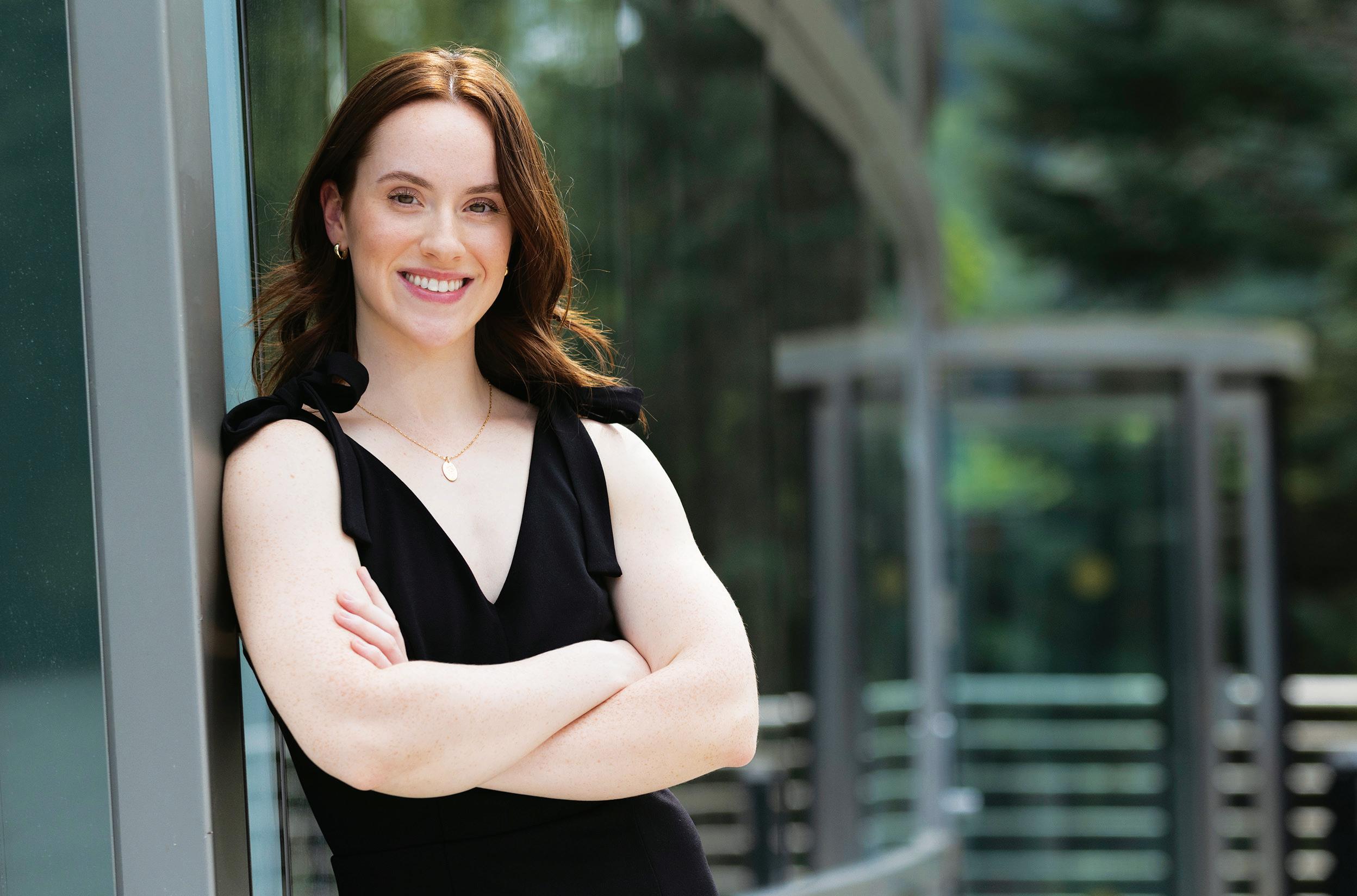
She tries to pass this challenge on to her students when assigning project briefs, leaving chunks of information out to test their ability to craft a strategic decision. Not only do they have to back their decision up, she says, but they must do so in a way that’s marketable.
Opportunities to share these types of lessons as an SOM graduate hopefully reinforce to students they have what it takes to handle any challenge in their career, Sherman says.
“If by the last day of the semester my student can come to me and say ‘I’m ready to go and I feel more confident in the skills I have as a strategic decisionmaker, then I feel I’ve done my job.”

A few years after Richard Berr ’91, MS ’93, graduated from SOM, he bumped into a familiar face during a stop at a restaurant in downtown Binghamton. It happened to be one of his favorite SOM professors: Elliot Kamlet.
In between discussing Berr’s work as a senior accountant at PepsiCo in New York City and reminiscing about life at Binghamton University, Berr joked, “Maybe I’ll come back and teach!”
Berr’s professional goals in the accounting field took him in a different direction — he’s spent much of his career working in finance and risk for the Ontario Teachers’ Pension Plan and is currently a director of total fund risk — but education has always been in his blood. It’s what ultimately motivated him to return periodically to Binghamton over the past two decades as a guest lecturer for SOM accounting students.
“I’ve always loved teaching because I come from a family of educators, but I fell in love with accounting and finance,” Berr says. “I figured it would be a great idea to come back, as someone who went through the program and lecture on topics that show SOM students how what they’re learning is applied in the real world.”
“Not everything in brand management has solutions you can look up in a textbook.”
— Sydney Sherman ’17,MBA ’18
Around 2003, after Berr had moved to Toronto, he called Kamlet and asked whether he could guest lecture in some of his classes.
Berr was drawn to the idea of being able to choose a unique subject or topic connected to current events. After meeting with a few other SOM professors, he felt he could put his own extensive experience working in derivatives through his roles at PepsiCo and the Ontario Teachers’ Pension Plan to good use for students at Binghamton.
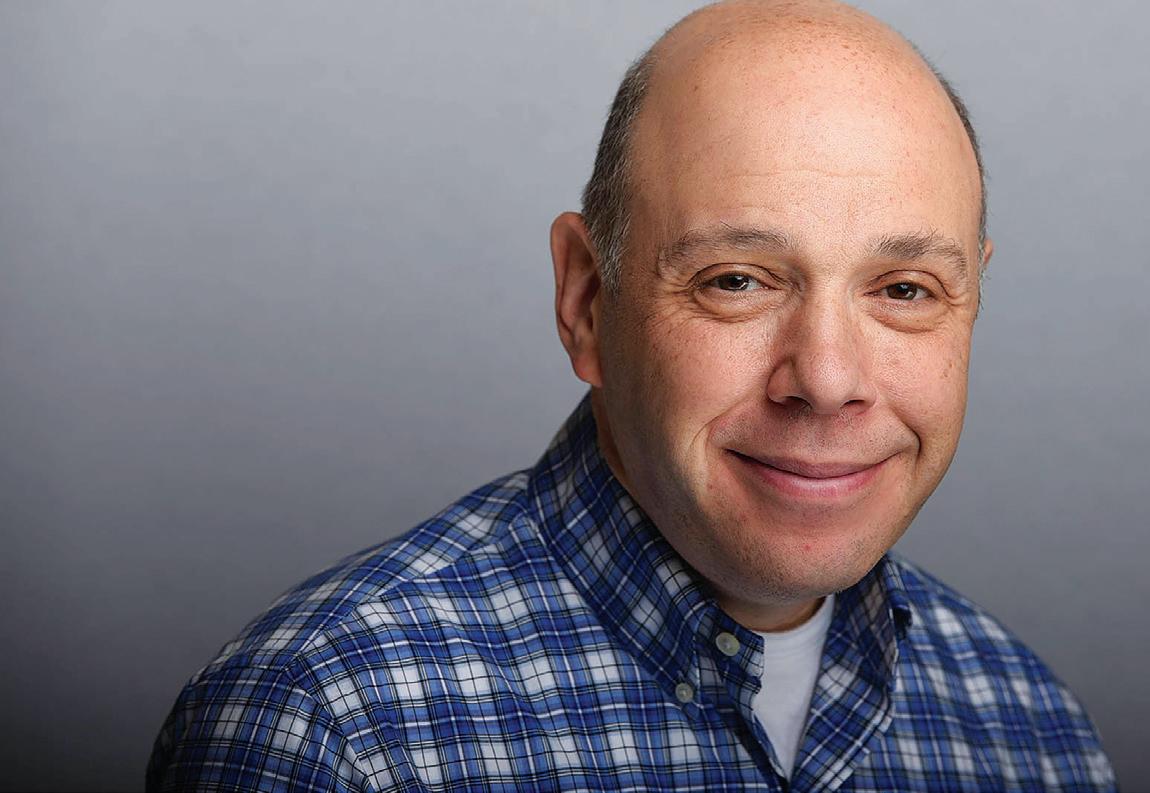
When it came to derivatives, for example, he was able to point out aspects of that work most students wouldn’t get to learn about in a one-term course. Stepping in for one of Kamlet’s classes dealing with ethics, Berr expanded the conversation to include how students might deal with ethical situations that would arise in their future jobs.
“Another thing nobody really talks about with finance and investments is how an investment can blow up if you don’t fully understand how it works. I felt the students should know something about the different risks associated with this,” Berr says. “So, I put together a lecture, some of it based on real things that happen and some based on hypotheticals, to hopefully allow them to take what they’ve learned and apply it.”
One challenge Berr has seen during his guest teaching in recent years is that students often seem to put much more pressure on themselves than necessary, even more than when he was in their shoes.
To help guide them, Berr tells students they shouldn’t be worried about having to know everything before going into their first jobs — but they need to have the background and recognize the value of the skill sets they can build upon in the classroom.
A lot of the rules for accounting come right out of the textbook, Berr says. The rest comes from experience, whether your career centers on accounting or branches out into other areas.
“The checklist on how exactly to audit cash — what was in the textbook — is exactly how it was the first week I was at Deloitte in my first auditing job,” Berr says. “What helped me move along in my career was my strong foundation of skills.”
Berr looks forward to his weeks teaching SOM students each semester. Every return trip to Binghamton is another opportunity to share his experience. He typically ends his classes by asking the students, “Hey, do you have any questions about what it’s like in the real world?”
Hearing some of the clever questions from those


students is part of what Berr finds so energizing about returning to campus.
“When I get the chance to help students get out of the textbook world and share insights about where their degrees could take them,” Berr says, “it’s rewarding to know I might have had a role in showing them something about a career they never considered before.”
5 ways to show your SOM pride
Follow SOM on social media and share our posts
Volunteer as a classroom guest speaker
Mentor an SOM student Judge a case competition
Network with SOM students for internships, job openings


FIND OUT HOW TO GET INVOLVED
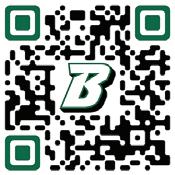

“Maybe I’ll come back and teach!”
— Richard Berr ’91, MS ’93
 By Chris Kocher
By Chris Kocher
When asked why now is the right time for her to retire, after 33 years at the School of Management, Professor Sara Reiter admits she’s thought carefully about the numbers.
She does, after all, teach accounting.
“People who are in their 70s — and I have very good health — often feel like people in their 50s,” she says. “There really isn’t all that much difference, except people in their 50s have many, many more years ahead of them. If I want to do more traveling and pursuing my hobbies, I need to do it.”
Since joining the SOM faculty in 1990, Reiter
has guided countless students through the facts and figures of the accounting profession, including the ethical questions that managers can face in the corporate world. In 2022, Poets & Quants named her among the nation’s Top 50 Undergraduate Business Professors.
Her teaching philosophy is a straightforward and practical one: “Some students have a lot of confidence and don’t need much handholding. Others don’t have a lot of confidence, and they need a lot more reassurance and structure to make things work for them. You have to try to support all of the different learning styles and maturity levels of students, so they all feel like they can do it.”
Reiter grew up in Corning, N.Y. and attended Cornell University for a degree in English literature — but working as a bookkeeper for a small company diverted her interest. She decided to pursue accountancy at the University of Missouri, where she earned her MS and PhD. She spent a decade as an assistant professor at the University of Illinois and Indiana University, but she returned to upstate New York when a faculty position opened at SOM.
“I really like it here at Binghamton. It’s the perfect size because you can be really involved in the University,” she says. “A school like Binghamton really does belong to the faculty, big enough to do research but small enough to know everybody.”
Over Reiter’s three-decade career at Binghamton, SOM — and the University in general — grew in student enrollment, rose in key rankings and attracted numerous accolades. She believes that Binghamton always has aspired to loftier heights and is finally catching up with its aspirations.
“We’ve always had great relationships with the New York City firms, tremendous hiring rates and very successful graduates,” she says. “It’s a matter of now getting recognition for what has already been there for 30 years.”
During her time at SOM, Reiter’s research examined various facets of bonds and pensions as well as concerns with ethics, professionalism and the environment. She’s more interested in how accounting practices shape society rather than how they affect the stock market.
“The idea that business is completely separate from the world of ethics is rather old-fashioned,” she says. “The controversies around environmental, social and governance reporting are strange politically, where some people are saying they want to forbid state pension systems from investing in any ESG [environmental, social and governance] fund. ESG concerns have a lot to do with the long-term health as opposed to the two-month health of corporations. How can you ignore how corporations are handling their supply chain if they’re likely to get kicked out of all the countries they’re in?”
Reiter’s career also has included leadership positions in the Binghamton University Faculty Senate, as well as serving as a representative on SUNY’s University Faculty Senate. She also helped establish SOM’s Diversity, Inclusion and Belonging Committee.
In 2016, Reiter’s service was recognized with a SUNY Chancellor’s Award.

Over the summer, Reiter led what she sees as her final class at SOM, although she doesn’t rule out teaching again in the future. Her retirement plans include traveling and training border collies to compete in herding, obedience and agility competitions. Sometimes she serves as a herding
judge for the American Kennel Club and the American Herding Breeds Association.
She lends her accounting skills as a board member and treasurer for the SusqueNango Kennel Club and the Australian Cattle Dog Club of America Inc., and she is also a member of the North East Border Collie Association and the Herding Association of Central New York.
At home, she currently has a Rottweiler and four border collies, including a 2-year-old that she sees as her retirement project: “I imported him from Ireland in January, because I knew I was retiring.”
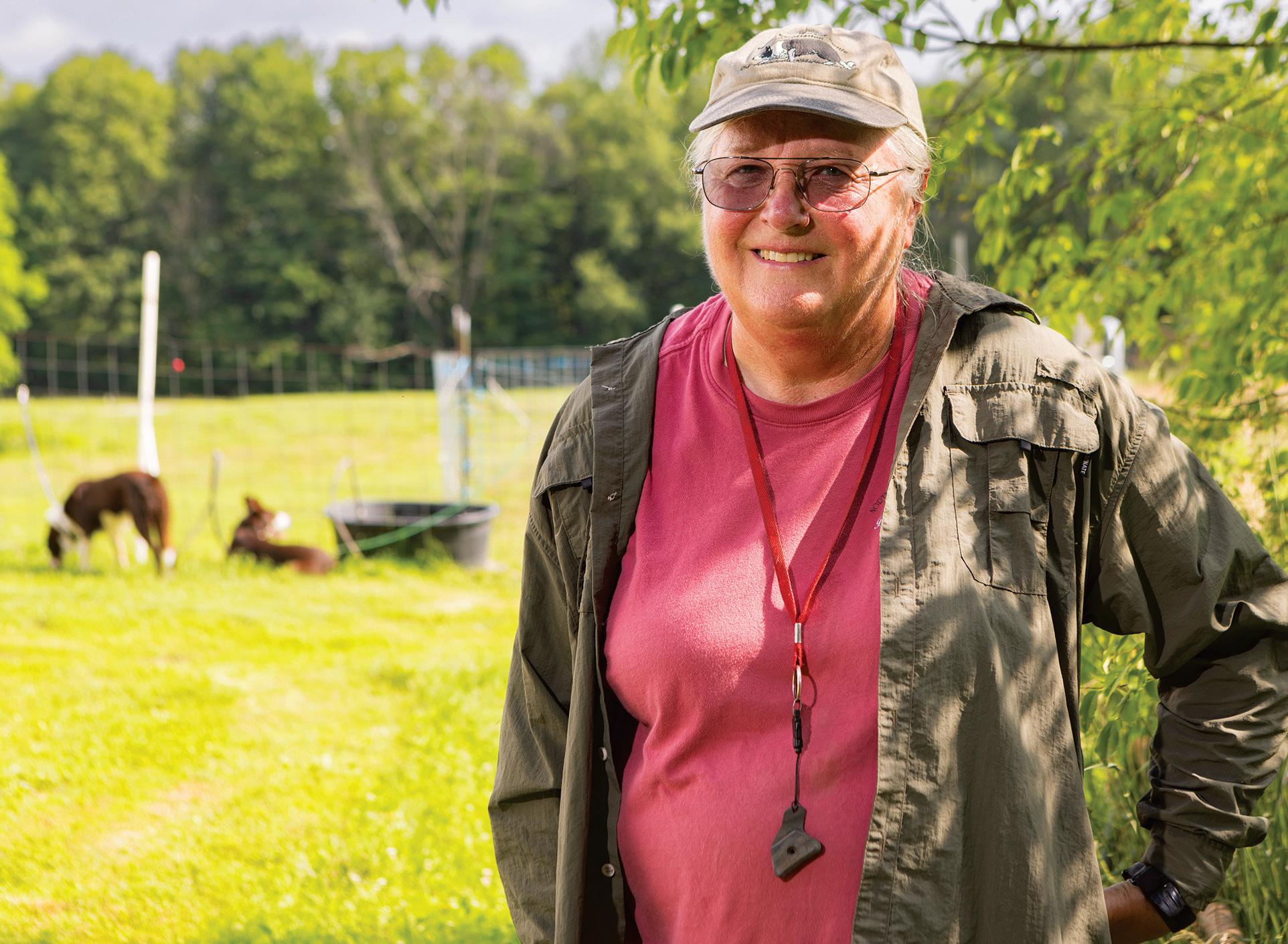
Reiter is also looking forward to simple pleasures like reading a book or relaxing without worrying about assignments to grade.
“I really want to explore getting back into things that I put aside maybe 50 years ago in order to pursue my career goals,” she says.
“ I really like it here at Binghamton. It’s the perfect size because you can be really involved in the University.”
 By Kim Mousseau
By Kim Mousseau
fter graduating from a high school with fewer than 100 students in Albany County, N.Y., Lynn “PJ” Parker ’22, MBA ’23 knew he wanted something bigger.
“I wanted to attend a large university with a good soccer program, and Binghamton had a great reputation as a top SUNY school,” Parker says. “Plus, Binghamton was in that ‘sweet spot,’ far enough away so I felt like I was somewhere new, but close enough that I could be home in two hours.”
So, in 2018, Parker became the NCAA Division I Bearcats’ newest goalie recruit. Because he had yet to declare his major, he planned to complete his
general education courses and “redshirt” his first year as he acclimated to college life and athletics.
By the end of his first semester, however, Parker had a better sense of what direction he wanted to take with his major and transferred to the School of Management. He joined the PricewaterhouseCoopers (PwC) Scholars Program, which he credits with helping him develop both professionally and personally through its strong mentoring component.
But, just as things were taking shape for him academically, Parker experienced a devastating loss when his mother died.
“Getting through that was hard, but it also made
me a better person,” Parker says. “Although I would trade anything to have my mom back, it really forced me to grow up and become a better man, and ironically, I’m thankful for that. But it’s strange not having your parent there, not only in hard times but to share in the good things that have happened. That’s when I miss my mom the most.”
In his second season as a Bearcat soccer player, Parker was NCAA-eligible, with playing time capped as he backed up one of the conference’s top-ranked goalies. “I wasn’t expecting a lot that year,” Parker says.
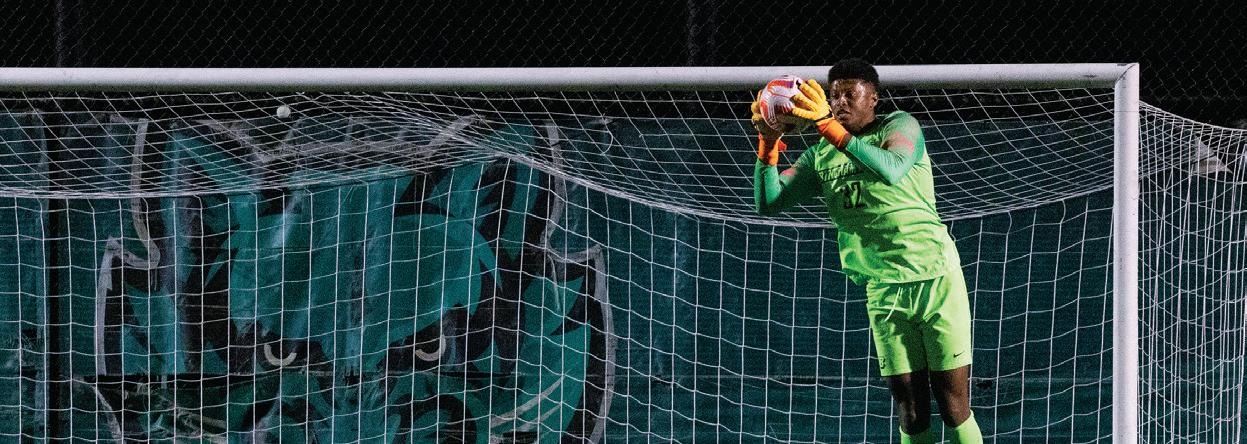
When the Bearcats’ starting goalie suffered an injury in a mid-season matchup at the University of New Hampshire, Parker was chosen to step in.
“Coach tells me I’m going in, and I was dumbfounded, thinking, ‘Wait…what?’” Parker recalls. “I think I kind of blacked out, but luckily, all that training and preparation takes over, and you just get into that ‘flow state’ and perform. And I finished the game without giving up any goals.”
After that, Parker’s athletic career picked up steam. He was named to the America East Men’s Soccer All-Rookie Team that year and earned a Defensive Player of the Week nod.
“That semester went exceptionally well,” he says. “That’s when I really fell in love with the game.”
Just as Parker was hitting his stride, a shoulder injury threatened to bring his college athletic career to a halt.
“I had surgery after that injury and an extensive rehab, and I thought, ‘I’m not coming back from this,’” Parker says. “For a goalie, shoulders are everything, and it was just really daunting having to fully extend my arms and block these shots that were coming in hard.”
For Parker, the mental recovery from that injury proved to be one of the biggest challenges he faced as an athlete at Binghamton.
While overcoming obstacles on the field, Parker also succeeded in the classroom. This past May, he completed his MBA with a concentration in finance.
Thanks to his participation in the PwC Scholars program, he also had a job lined up for after graduation as a financial consultant for the cyber risk and regulatory arm of PricewaterhouseCoopers in New York City.
“I’ve been developing a close relationship with
PwC for years now,” Parker says, “and it’s felt like home away from home to me. I am excited to extend that relationship to my first job.”
Looking back on his time as a Bearcat goalie and SOM student, Parker has nothing but fond memories of his experiences at Binghamton.
“There have been a lot of surprises, a lot of happy surprises and a lot of obstacles,” Parker says. “But those obstacles have made me a better and more well-rounded person, and I wouldn’t trade those experiences for anything.”
#1) Lean into adversity. I found that was something practiced in soccer and academically. Working through adversity is how you grow. Success on the other side of a challenge is like a trophy, something to show for your hard work. And when you look back, you can think, “That was hard, but I am happy I did it.”
#2) You’ll be nostalgic for the moment you are in now. It’s easy to get caught up in day-to-day living; you think things are moving slowly while you’re in the middle of it all. But time is moving fast, so I try to savor and appreciate the moment I am in because I know that one day, I’ll look back and want to remember it.
#3) View situations from different perspectives. There have been times when I wasn’t happy playing soccer or happy with the classes that I was taking, but training myself to see things from a new
perspective has really helped me mature as both an athlete and a person. Sometimes that means just putting myself in someone else’s shoes for a moment.
#4) Have a reason to get out of bed in the morning. Not every day is going to be the America East Conference final. But finding real enjoyment in some of the less extravagant moments has helped me appreciate everything a little more.
#5) Have people that you care about. The most important lesson is to appreciate the relationships you have. I don’t take relationships for granted at all. I love my friends and family, and I make an effort so they know that. I make it my practice to pick up the phone and reach out regularly, and I’m lucky because they reach out to me, too.
aman Mirzaliyeva and Abigail Sneddon were not only named the School of Management’s Seniors of the Year for 2023, but they also made this year’s Best and Brightest Business Majors list published by Poets & Quants, a top publication for business education news. We asked them to share some of their favorite experiences as Binghamton students and reflect on how SOM prepared them for successful careers after graduation.
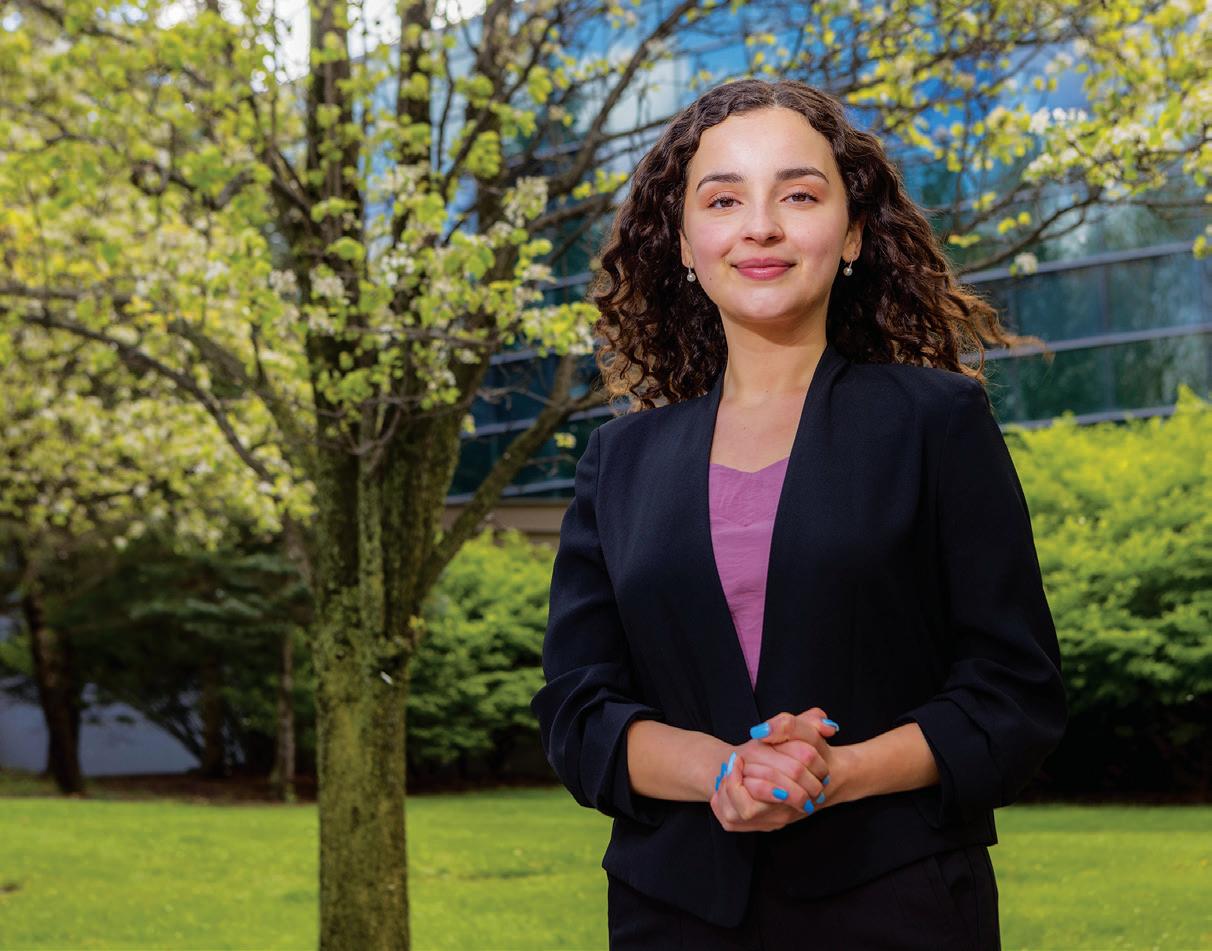
concepts covered in class to my previous internships. My favorite part was analyzing various cases of audit failures including the scandals with Enron, Madoff Securities and Boeing.
My favorite professor was Associate Dean George Bobinski. Not only was he my Introduction to Decision Making in Management professor, but he also served as the instructor of my PWC Scholars Community Project course.
Since my first class with him, I could tell he genuinely cared about his students and the SOM community as a whole. He always challenged us to think outside the box and motivated us to look at things from different perspectives. He provided continuous support and guidance to the management consulting group student organization that I was a part of by helping us develop and execute case competitions for hundreds of students. I am extremely grateful for everything I learned from him.
MAJOR: ACCOUNTING HONORS, MIS CONCENTRATION
When choosing a college for my undergraduate studies, SOM was always at the top of my list because of the wide range of business tracks offered to students, the variety of student organizations and the outstanding accounting program that’s ranked among the best in the nation. Since I was not entirely sure which business degree I wanted to pursue, knowing SOM offered multiple business concentrations and student organizations to try was very important to me.
My favorite class was auditing, an accounting course taught by Assistant Professor Alfred Yebba that I took in the spring of my senior year. I enjoyed getting to learn about the theory and practice of auditing and relating the
Coming into SOM, I was unaware of how many opportunities are available to business majors and just how much one can do with a business degree. After participating in multiple case competitions and projects, I developed a passion for technology, which was something I never thought I would be interested in.
Those hands-on experiences helped me build strong technical skills, experiment with various software platforms and land a data analytics job at Deloitte.
I feel proud and thankful to be a part of SOM because of how tight-knit and supportive our community is. When I first started, it surprised me how many alumni visited campus to share their professional experiences with students. I have since realized that giving back and supporting each other is an integral part of the SOM culture.
Being surrounded by people who want to see you succeed and motivate you to achieve your goals is truly an amazing feeling. From professors to peers, to career advisors and everyone in between, I have always felt personally supported and encouraged. SOM has played a tremendous role in both my personal and professional development, helping me achieve my full potential.
MAJOR: BUSINESS ADMINISTRATION, FINANCE CONCENTRATION
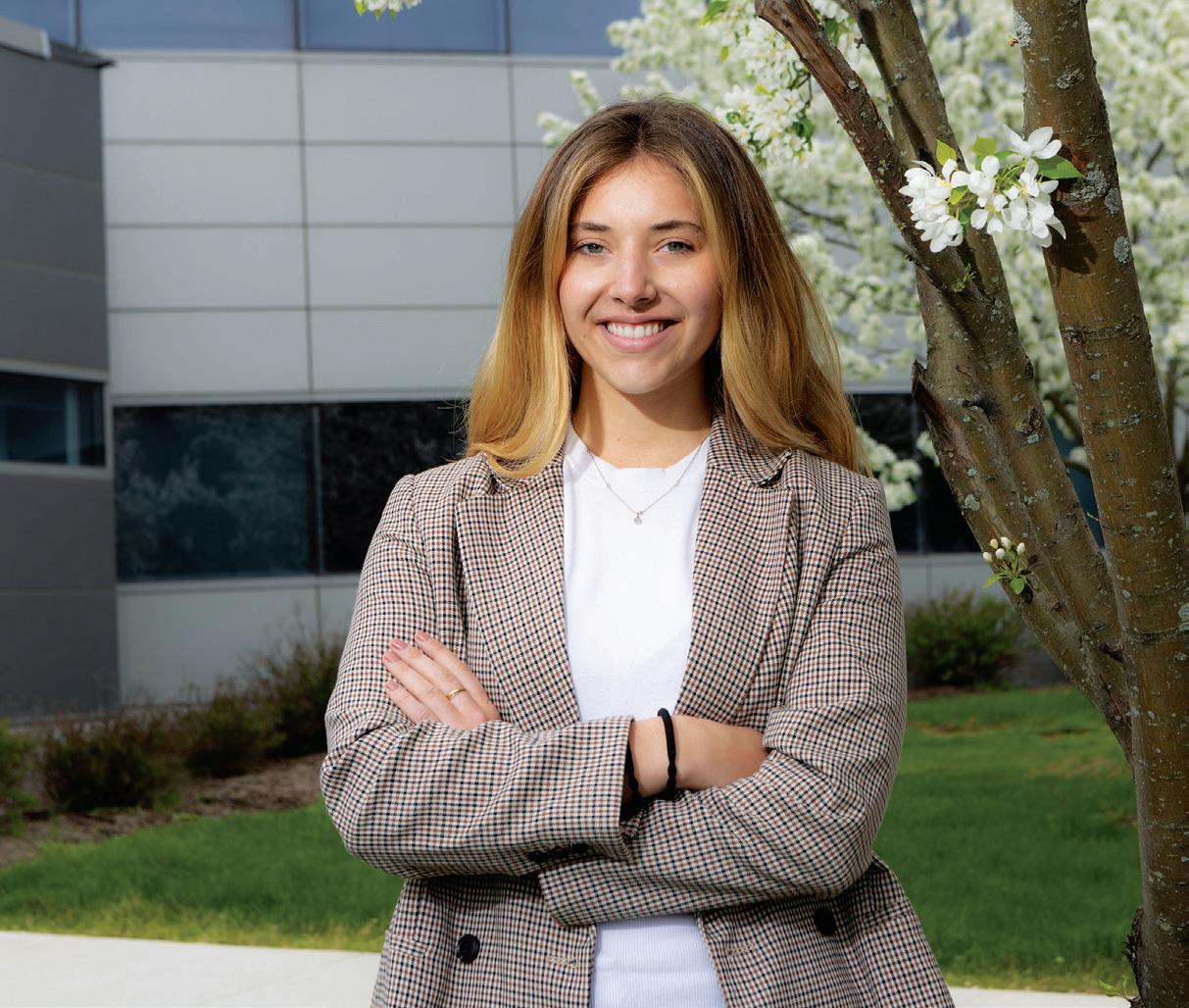
What is the biggest lesson you learned from studying business?
To consider the implications of business decisions and be aware of their externalities. This was an overarching lesson in many of my classes, but particularly in my Environmental, Social and Governance (ESG) Investing in Public Markets course. We studied various models and learned to consider all the stakeholders. Each decision I make, both as an investor and a businessperson, affects the greater world.
What surprised you the most about majoring in business?
I previously thought business, once learned, was relatively static. I have since learned how rapidly the business environment shifts. The corporate world has become significantly different since I was a first-year student. A large portion of this is due to the COVID-19 pandemic and the shift to a remote or hybrid environment. Business individuals must not only react to these shifts, but also initiate them through innovation. I think the most exciting part is how one technology or idea can so quickly shift the business world for a few weeks, months or even years.
What academic achievement are you most proud of?
I’m most proud of receiving an A- in my Complex Variables course and my subsequent growth in confidence. Much of this course dealt with imaginary numbers, and I struggled visualizing the material. It was the greatest academic challenge I faced. Almost everyone else in class was a math major, and at points it seemed like they all spoke a language I had never learned.
However, as the semester progressed, I began to realize that I could learn this new language. While I did not speak it fluently, I learned how to be okay with that. This was a new mindset for me, and I have been applying it ever since.
What are two goals on your professional bucket list?
It sounds idealistic, but I have always believed that finance can change the world for the better. As such, two items on my professional bucket list are to work for a government organization that makes economic policy and to work for an activist fund.
Growing up in the aftermath of the 2008 financial crisis and experiencing the current economic volatility has made me more aware of the direct impact economic policy has on the daily lives of the average American. I think working within economic policy sometime in my career would be incredibly challenging and rewarding.
Activist investing requires careful planning and strategy, but when successful, it can yield an incredible power in pushing companies toward social and environmental progress. I would love to be a part of that.
What’s your advice to future business students?
You need to know who you are, what you care about, and what your strengths are. Once you know this, you can figure out how you fit into a group dynamic and what you can offer to that group. This is important because much of business is not about your individual effort, but about what you contribute to your team.
I also urge students to take advantage of as many opportunities as possible, such as case competitions, clubs, internships and networking events. Business is an exceptionally broad and ever-expanding field, so spending time to figure out what exactly you want to do is very worthwhile.
ver the course of a 40-year career teaching in the School of Management, Elliot Kamlet ’76 had a fun tradition for the start of each class that his students never forgot. He’d ask them, “Questions, comments, anything you want to talk about?”
Pretty much anything was fair game, except sports.
Among the estimated 15,000 students Kamlet taught as a lecturer at Binghamton University, this tradition remains a beloved memory and it’s one that some have found ways to continue after becoming teachers themselves.
In the days following Kamlet’s death March 1, hundreds of former students and colleagues took to social media to share tributes and stories of his impact on their lives at Binghamton and beyond. Kamlet left a legacy that can’t only be measured in numbers, says Dean Schuckman ’73, a retired tax partner at PricewaterhouseCoopers (PwC) and an adjunct instructor at SOM.
That’s why he didn’t think twice about volunteering with Jason Baker ’99, MS ’00, a tax partner at PwC and former student of Kamlet’s, to help teach one of Kamlet’s courses to finish the spring semester.
“Stepping in to help teach Elliot’s class was sad, but it felt good we were helping continue that which he would’ve liked to be continued,” says Schuckman, an adjunct since 2015, who teaches accounting for income and business ethics. “When
he passed, it left a large hole in many people’s hearts.”
While discussing his career in 2020, Kamlet pondered why his name got mentioned frequently in conversations with alumni about memorable faculty. He attributed it to the close relationships he formed with students during the PwC Scholars annual 10-day international trip, in which students travel to various cities around the world to explore the different cultures and foreign business practices.
Kamlet introduced this component of the honors program when he served as the PwC Scholars director.
“He taught the practicalities of accounting, the broader aspects you don’t always get in a textbook,” Schuckman says. “He brought the whole profession to life and made it sound not only lucrative but rewarding.”
Although Schuckman didn’t know Kamlet personally when they attended Binghamton around the same time as students, they later developed a close friendship. After Kamlet had taken over as advisor for the PwC Scholars program, he even invited Schuckman to be a guest speaker in one of his classes.
Kamlet was always eager for his students to gain some valuable “real-world” perspectives.
“Elliot was instrumental in getting me to teach,” Schuckman says. “He loved the work of accounting and his enthusiasm didn’t just teach people. His enthusiasm inspired people.”










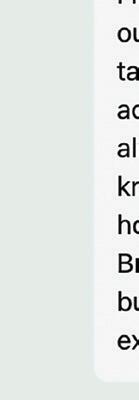

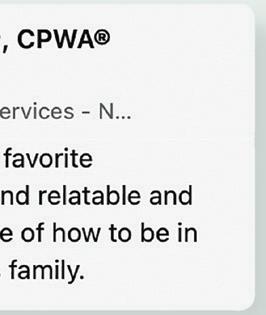
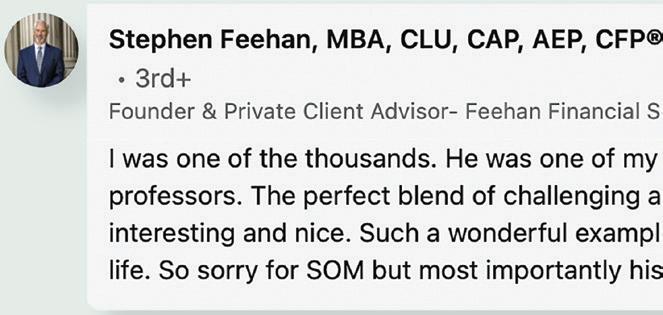
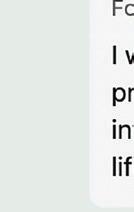









Upon learning the news of Elliot Kamlet’s death, hundreds of his former students and colleagues took to social media to share condolences and reflect on how he shaped their Binghamton experience. Here’s what some had to say.



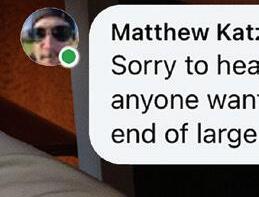
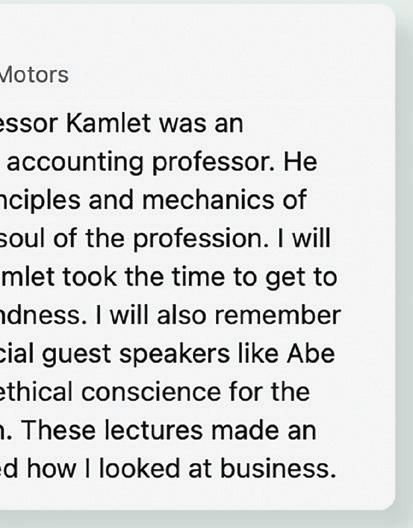
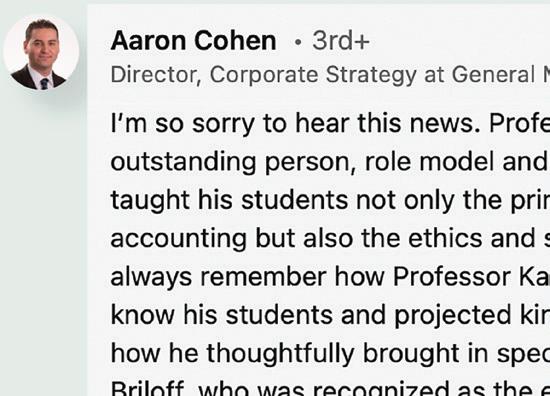
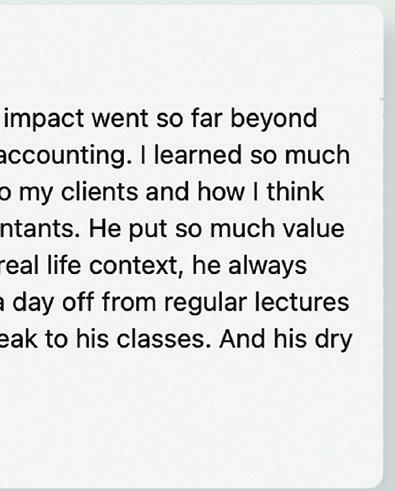


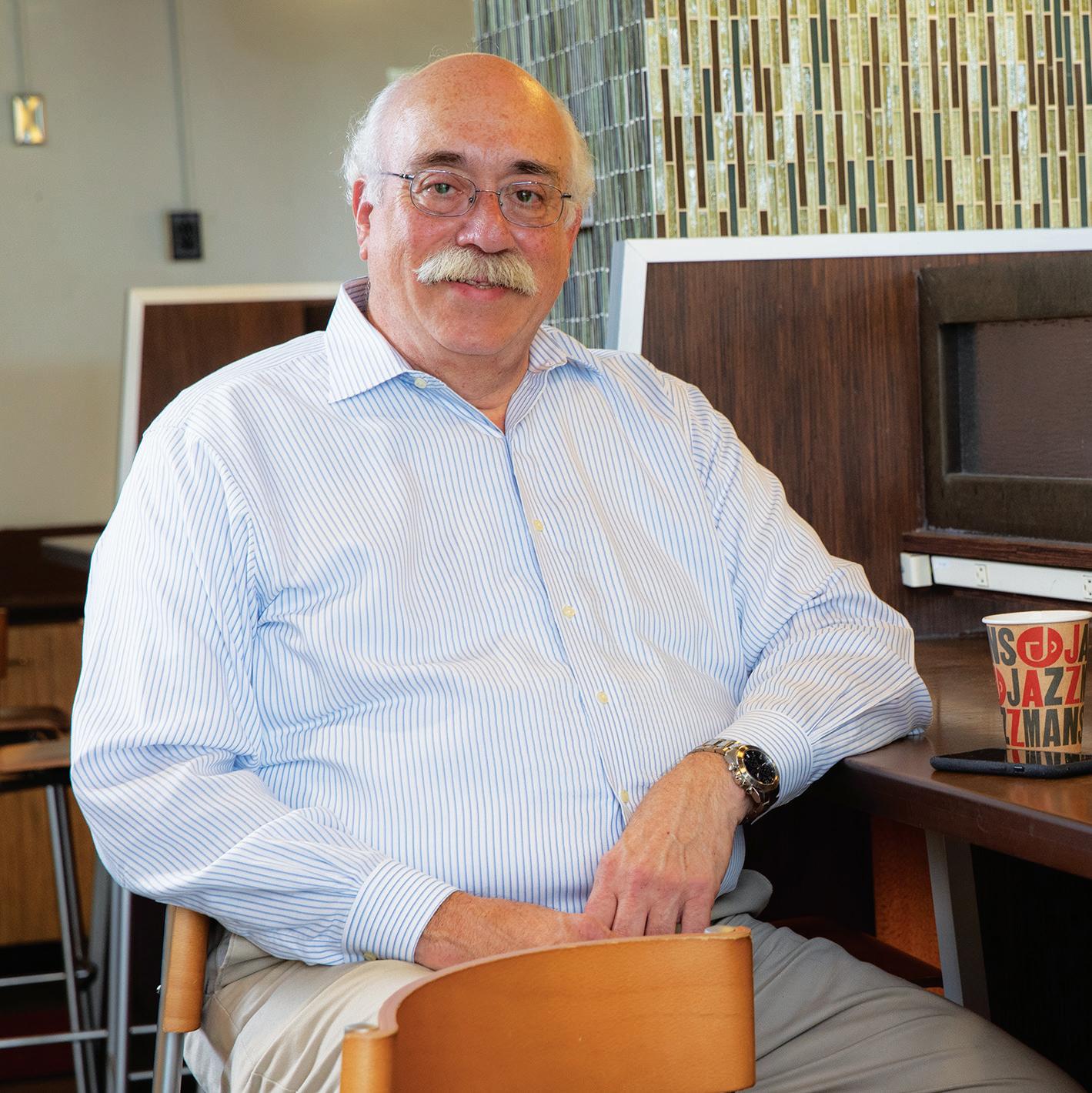
Employees at public companies tip their taxi drivers more on days when their companies perform well in the stock market, according to new research from Cihan Uzmanoglu, Zurack associate professor of finance.

While the effect on tipping is shortlived, the research finds it is stronger for firms offering more stock-based compensation. These findings have implications for how employees make a local economic impact in the areas where they work.
“Employee spending is a big factor that governments consider when trying to attract companies into their area, as it can stimulate the local economy,” says Uzmanoglu.
Uzmanoglu analyzed the GPS and payment data from around 2 million taxi rides that took place in New York City between 2009 and 2016. He focused on pickups that took place between 5 and 6 p.m. (the end of a typical work day and New York Stock Exchange trading hours) within 100 meters of public firms headquartered in NYC to account for the taxi rides of employees.
Uzmanoglu then explored how a firm’s stock market performance impacted tipping for taxis taken near its headquarters location.
“The taxi setting is great because you’re unlikely to bump into the same taxi driver again, so how you tip now isn’t going to influence the quality of service the next time you take a taxi,” he says. “How someone tips a taxi driver probably says something about how they feel in that moment — do they feel happier and wealthier? And is that being driven by the stock performance of their employer?”
Uzmanoglu found when a firm experienced a positive shock to its stock performance, its employees would tip their taxi drivers more. This increase of tipping would only happen on the day of the positive stock performance though, meaning the effect is temporary.
“The short-lived nature seems to suggest that the employee feels good about the stock performance of their company that day, and that happiness is motivating them to tip more,” Uzmanoglu says.
He also found tipping does not decrease significantly when firms’ stocks perform poorly.
“There seems to be a socially acceptable minimum tipping amount people follow, regardless of stock performance,” Uzmanoglu says. “So when you have a bad day in the stock market, I don’t see people tipping less than this socially acceptable benchmark.”
Uzmanoglu tested the strength of his findings by looking at tipping activity at different times of the day and in wider perimeters around the companies he studied. The further the distance from where those companies were located, as well as the end of the work and trading day, the more the effect decayed.
These findings could have broader implications about the impact businesses have on the community around them, he says.
“If employees are doing well, they are likely to spend more money in that local economy,” Uzmanoglu says. “While I just looked at taxi rides here, these findings may indicate that the stock performance of a firm may influence the overall discretionary spending of employees.”
The paper, “The stock market tips” was published in the Journal of Empirical Finance.
— Allen Wengert By My-Ly Nguyen Sperry ’00, MBA ’02
By My-Ly Nguyen Sperry ’00, MBA ’02
The School of Management has essential funding to recruit and retain top faculty, thanks to Binghamton Fund donors who make this investment in faculty excellence (and more) possible.
In fact, SOM was able to add six new faculty members with Binghamton Fund support in fiscal year 2022-23, which ended in June. In addition, the inaugural Dhillon Family Faculty Fellow program honoring former Dean Upinder Dhillon, who died in April 2022, was launched last fall with additional donor support to aid in the recruitment and retention of outstanding faculty.
“Recruiting new faculty who are high-caliber researchers and innovative and engaging teachers enhances the educational experience at Binghamton,” SOM Assistant Dean Linda Reynolds says.
Having the means to offer fellowships to highperforming faculty to pursue groundbreaking research was important to Dhillon, SOM Dean Shelley Dionne adds. “The enormous outpouring of support from alumni to launch the Dhillon Family Faculty Fellow program in fall 2022 has made a transformative impact on SOM, and the incredible generosity of our alumni in making this happen would have humbled Upinder,” Dionne says.
As part of the EXCELERATE campaign for Binghamton, donors open doors across campus. Binghamton Fund gifts are used immediately when opportunities arise to nurture bright minds and pioneering work, alleviate students’ unforeseen and unmet financial needs and shape an exceptional University experience.
In addition to supporting faculty recruitment, donors to the Binghamton Fund for the School of Management also:
• Increase access via scholarships, including by expanding aid to SOM students in the awardwinning Transformational Leaders Program,
which provides structured, individual leadership development and professional guidance that help participants chart a course toward successful business careers.
• Ensure faculty and students have access to technology and software that broaden their skills and allow them to succeed as learners, researchers and professionals.
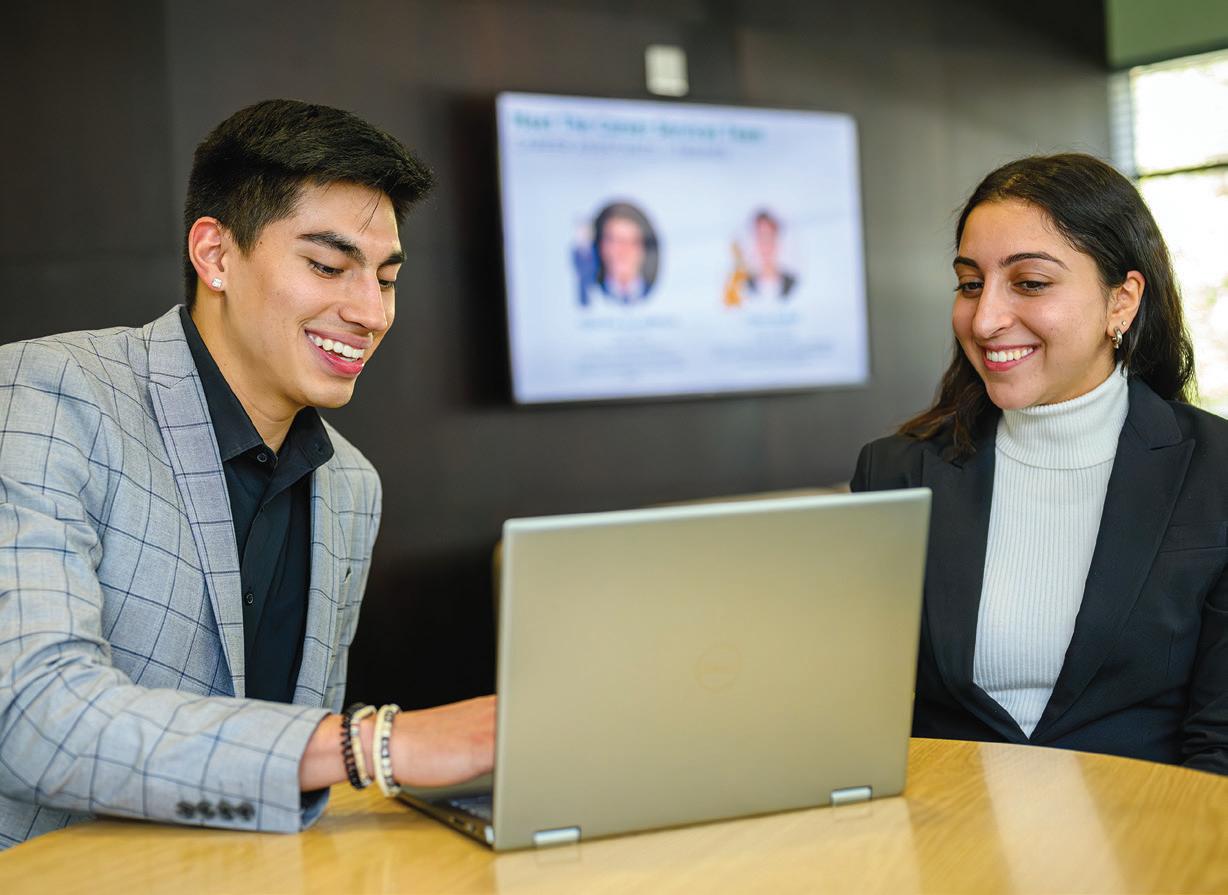
• Give doctoral students opportunities to travel and present their innovative research at conferences, gain valuable feedback from other researchers and grow their professional network.
Learn more: excelerate.binghamton.edu
School of Management
PO Box 6000, Binghamton, NY 13902-6000
Subimal Chatterjee, SUNY distinguished teaching professor of marketing, was included on the Poets & Quants list of the “Top 50 Undergraduate Business Professors Of 2022,” along with Professor Sara Reiter (see page 16). It marked SOM’s third consecutive year being represented on the list.
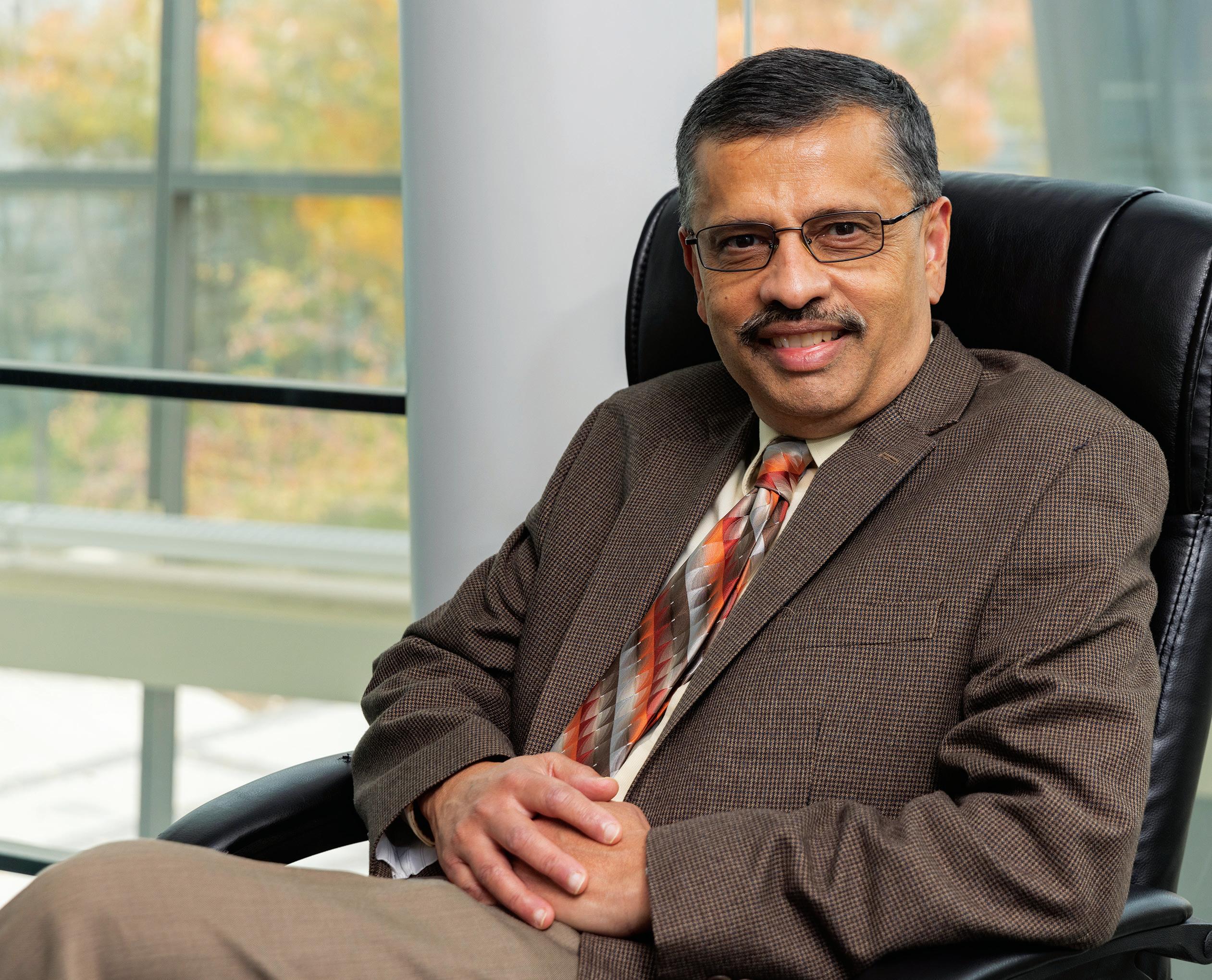
Since arriving at Binghamton in 1997, Chatterjee has been a favorite among students, who regard him as a practical, relatable and inspiring instructor.
Chatterjee’s research interests include consumer behavior and managing customer satisfaction/brand loyalty, and his work has appeared in impactful marketing journals and major media outlets.
